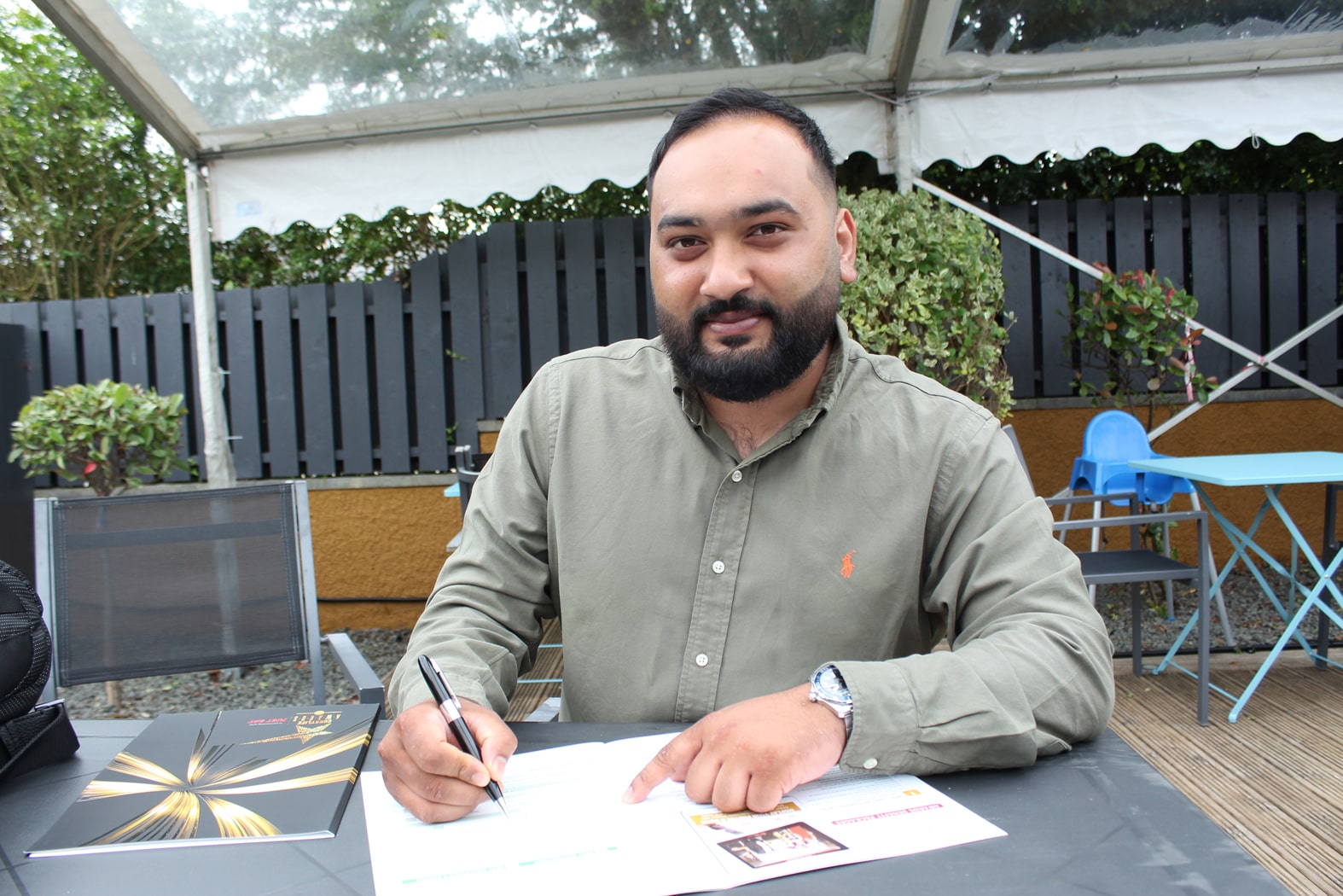
Enduring love for hospitality made Habibur Curry King
Habibur Khan, a 23-year-old young curry entrepreneur. His father Matin Khan is also an established businessman who has been involved with restaurant trade since 1998. They have two family establishments in Edinburgh, Scotland are the Itihaas Restaurant in Dalkeith and the Radhuni Restaurant in Lonehead. Habibur Khan is at the helm of very popular restaurant Radhuni. This young “Curry King” from Edinburgh talks about his success story with Syed Nahas Pasha, Editor-in-Chief of Curry Life Magazine.
“I work as an accountant in my day job, but I see the restaurant as my future. I like to make everyone happy; I like to manage; when providing service and food to customers, their smiles is what drives me.”
Habibur Khan, otherwise known as ‘Scotland’s youngest curry king’, has a lot on his plate. The 23-year old divides his time between his conventional 9-5 job with managing the award-winning Radhuni, a 150-seat restaurant located in Loanhead on the fringes of Edinburgh. “In the area it’s what I’m known for: having a 9-5 job and working 5-12 in the restaurant; I’m almost working 24/7. But I enjoy it – I love it – and without it, I don’t know what I would be doing.”
With Habibur firmly at the helm as Radhuni’s managing partner, the Indian-Bangladeshi restaurant, nearing its 10-year anniversary, has picked up notable accolades. Despite the praise Radhuni has garnered, though, Habibur remains determined not to be complacent in his role, and proves to be exceedingly determined, motivated and committed to working in the industry.
“I grew up with many of my family working in restaurants, so I grew an emotional attachment to them. Growing up, I was told not to come near the restaurant so it wouldn’t affect my studies, but I’d always find an excuse to visit; I’d miss the last hour of school and come without anyone knowing. I saw it as helping myself to help the restaurant, because I just loved it.”
At the age of 12, Habibur officially started working at the restaurant, though he wasn’t too keen on his first role. “My dad put me in the back because I wasn’t tall enough. After three or four weeks of washing dishes, I thought no, I’m going out in the front, the back is not for me.” Once he was out in the front, customers would bear witness to Habibur, in his own words, ‘running around like a headless chicken’: “It was fun working whilst still being at school; my friends couldn’t believe it. They would come in and eat with the family and find me working. It’s an opportunity not everyone gets, so I was very lucky to have it.”
Habibur’s enduring love for hospitality undoubtedly stems from his father’s long-standing involvement in the industry, who himself has been running takeaways and restaurants in Edinburgh for almost 30 years. “I do want my father to retire, he’s been doing it for a long period of time, but there’s still lots to learn from him. There’s no end to learning; he’s probably said things to me four, five years ago and I probably thought, ‘what are you talking about’, but as the time goes on, I realise why he said it. Basic things can end up meaning a lot.”
And what’s the best thing Habibur has learnt from his father’s expertise in the trade? “There is one thing he taught me which I still talk about: a good waiter will not only serve one table, but on his way back, he will always bring something else back to the bar to make his night easier. If I was to go to a table and serve, that’s not my job finished. There are other tables around, so you make sure you pick something else up – why should I leave it for someone else?”
Surprisingly, Habibur claims his father wasn’t too favourable of his son working in restaurants at a young age, and to this day remains sceptical: “he didn’t like me working from a young age, and he still doesn’t like it now. He says it’s not a business you want to get into due to the manual labour. It’s unsociable hours, but if you build a good team, these things go away. With any business you need to put in the hours, even if you’re not getting paid. Once you’ve put in the investment it all pays off. But you need a lot of patience, to believe in yourself and believe in the business.”
What does Habibur have to say, then, to the younger generation who may feel obliged, but not necessarily enticed, by the idea of taking over the reins of their family’s restaurants?
“My message would be come in and see for yourself how you can drive it forward. You might come in and adjust things that’s going to change the whole concept of running a business; you could make it easier for you or your family to run. Bring in something new that’s going to help the business, fresh ideas, a fresh motive, and see if there’s a gap in the market. If you see it, then trade is always there.”
As the city of Edinburgh has been witness to many changes over the years, Habibur states food trends have stayed relatively stagnant: “I don’t think trends have changed much. Customers are sticking to what they know; authentic Indian curry houses are still very popular in the area. In terms of change, the only thing you can change is how the décor looks, or the quality of chicken, lamb or spices – if you’re selling the top notch of everything, more customers will come to you.”
It’s perhaps no surprise, then, that Radhuni’s most popular dishes are the more conventional among the British: “Bhuna, Madras, Dhansak, they are the bread and butter of our menu. You must have them, because customers still love them. They are used to it and have been for many generations. If you don’t have them in the restaurant, 70% of your trade is gone.”
Does this mean Chicken Korma remains the UK’s no.1 curry? “Yes, it’s the most famous talked about curry, it still is,” Habibur says. “Our customers still love a Korma, Chicken Tikka Masala, Balti, these are still popular curries. Without them, I wouldn’t be able to run my restaurant – customers would start asking me ‘is this an Indian?’”
In today’s current climate, Habibur acknowledges how essential keeping up with the trends is to survival: “everything has moved over to social media, that’s where there’s presence, plus it doesn’t cost you anything. All it takes is a bit of research and knowing your customers. It’s all about what I call ‘organic growth’ – using Facebook, twitter, Instagram – you as a business should be using it too if it’s going to help your business.”
The need to invest in your staff is significant too, Habibur iterates: “we’ve got about 15 staff, and they are very important. Everybody talks about the staff crisis and how they can’t run restaurants; yes, there is a crisis coming from our countries – Bangladesh, India, Nepal, and Pakistan – but that doesn’t mean anything. What are people doing in the UK? They also have an interest in hospitality; we need to bring them in, give them the chance, teach and train them and they’ll be just as good.”
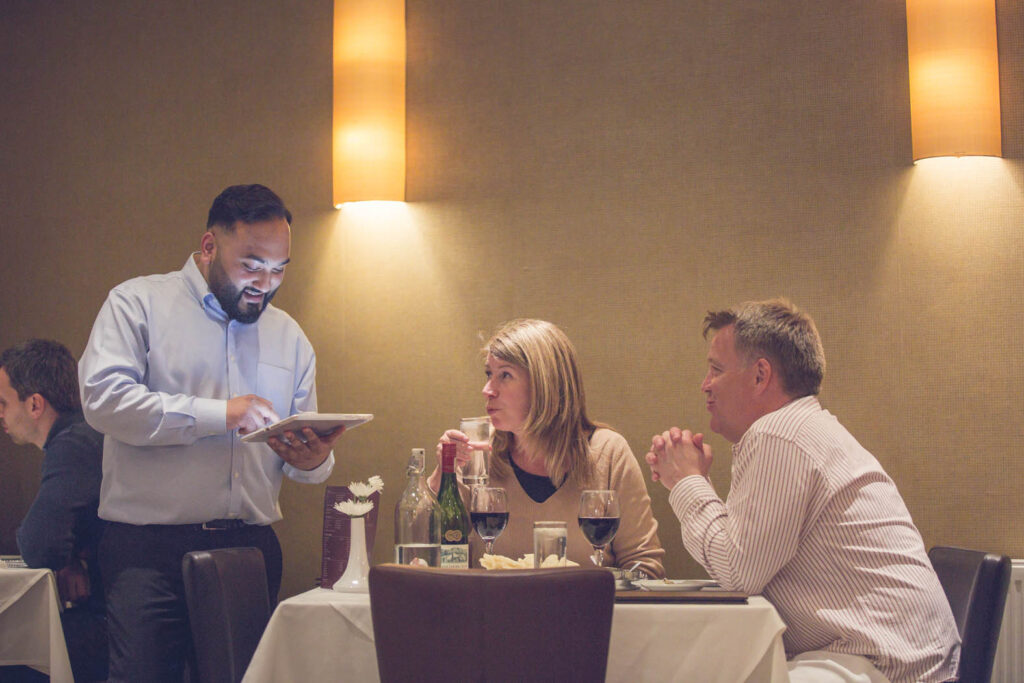
Keeping ahead of the game is equally vital for Habibur: “For us and the new generation who are stepping into the game, you have to see what the gap in the market is and look at what others are doing that you’re not doing. It’s not about copying them, it’s about how you can do it better. If everybody does the same thing, everyone remains the same, so how can you trade something new with a twist that your customers will love? If you invest in your kitchen, they invest back at you because you’ll get money back in return. If you’re making £500 profit a week, put £200 away for a rainy day, and another £200 for yourself. It’s not all about profit. Invest in your staff, invest in business.”
In order to keep business healthy, then, do fellow restaurateurs freely exchange ideas? Habibur sees the benefit in doing so: “I do this all the time. Like I said, there’s never a stop to learning. I could be doing something wrong – which I think I’m doing right – then my friend will tell me how it should be. So, we are always learning from one another and giving each other ideas, and there’s nothing wrong with that. As long as you’re learning that’s the main thing, because that’s what makes you better. One person can’t know everything about a business; you have to take ideas from everyone, put it together and change it to how it works for you and your customers.”
So, there is nothing to fear from a bit of healthy competition? “I don’t have any fear about competition. My only fear would be if someone was to come along and do the exact same thing as me. But as I said I’m always learning. Let them do the same, hopefully I can then make my product better.”
To help bring in fresh ideas, Habibur admits to eating out two, three times a week, much to the annoyance of some: “My friends who are not in the game, they hate eating out with me, because I am always so observant with everything. They say: ‘you never take a break’, but for me I’m learning something new!”
The Coronavirus pandemic has undoubtedly put further strain on an already struggling sector, and with a recession and unemployment looming, there is mounting uncertainty on the survival of many restaurants. But how was the last six months for Radhuni? “We are a restaurant and takeaway, and 70% of our sales were from the restaurant. Obviously, we had to close down. We had to adapt very quickly from running as a restaurant to takeaway only, which meant reducing opening hours and staff. Initially I was scared, because I didn’t want to let go of the great asset that we have, but then I thought, if everywhere is closed, where are the doctors and nurses going to eat once they finish their shift? They can’t afford to lose time standing at a supermarket. So, I decided to stay open to feed those who are saving us, and because we were getting almost hundreds of orders in from the local hospital, the police force, fire station, it turned out that I needed all my staff there. We all help each other, and we were lucky to be running the business as well.”
After an ostensibly successful attempt to survive lockdown from a business perspective, how does Habibur plan to move forward, bearing in mind the country’s uncertain future? “I’m not cutting down any staff. Because of the extra measures we’ve put in place, our hygiene is good anyway, and I want to take the bar up and see what else I could be doing. In order to do better, I need more pair of hands to help me. So, I’m not cutting down on anyone at the moment.”
Though Habibur certainly hopes for expansion down the line, he reiterates how important timing is for the business: “Let’s see where the current climate is first. There’s always opportunities coming up, but it needs to be the right opportunity, so fingers crossed.”
Our fingers are certainly crossed too. Taking into consideration everything that’s happened this year, does Habibur believe there’s still money to be made in the trade? “There is, but it doesn’t come to you. You need to put the hard work in first. You put it in, and you see the rewards – the harder work you put in the more reward you get, even it means waiting for six months… you’ll soon get the reward.”
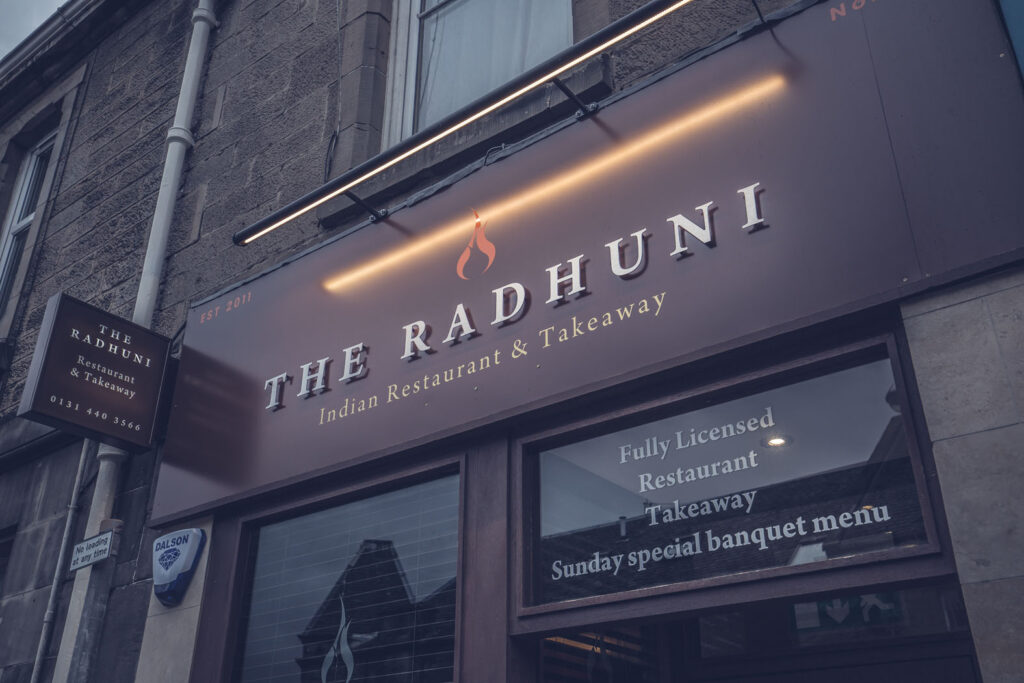
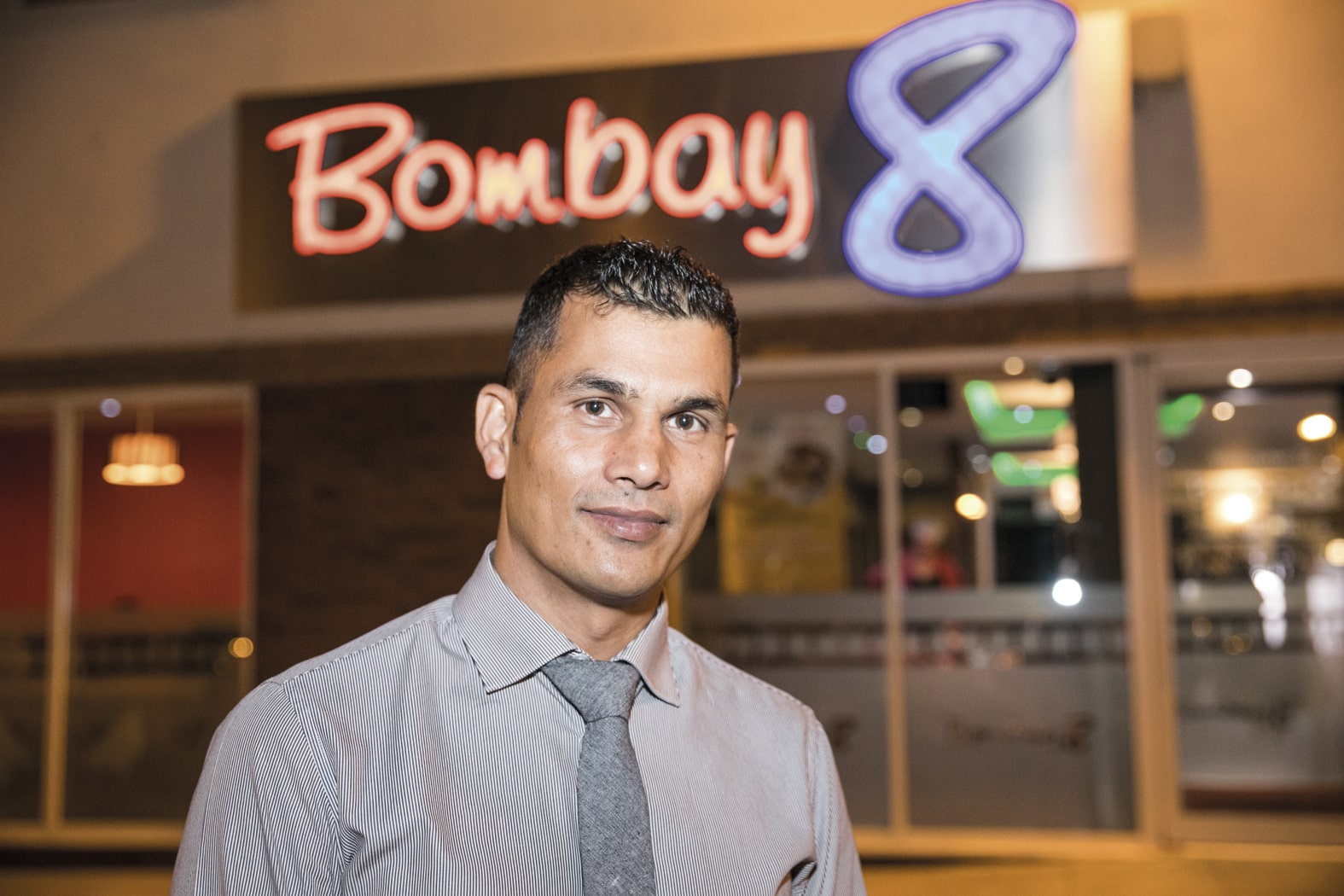
Bombay 8 – A Gamble Paid Off
Bombay 8. A beautiful restaurant in Warrington.Very good food and decor. Customers love it. Our reporter Sam Smith talks to owner Mofozul Miah and writes about their delicious food and the secret to their success.
Restaurant owner Mofozul Miah took a gamble when he opened an independent Indian restaurant on a Warrington’s retail park full of name branded restaurant chains. The competition was fierce, but ultimately the gamble paid off.
Today Bombay 8 stands shoulder to shoulder with any of its competitors and is highly regarded by locals and shoppers that visit the area. Located near a large Ikea and various other shopping outlets, Bombay 8 offers customers freshly prepared Indian & Bangladeshi dishes of exceptional quality.
The restaurant takes advantage of passing shopper trade, but primarily provides curry for a loyal group of regular customers who come from all over the area to sample it’s recipes. In fact, the restaurant is directly below a Travel Lodge hotel, meaning the occasional weary business customers visit the restaurant, drawn by the smell of the cooking.
“We see them all the time” Says Mofozul, “They come down from the hotel, experience our food and then decide this will be where they stay every time they visit. Just so they can eat here again. They usually bring their colleagues too.”
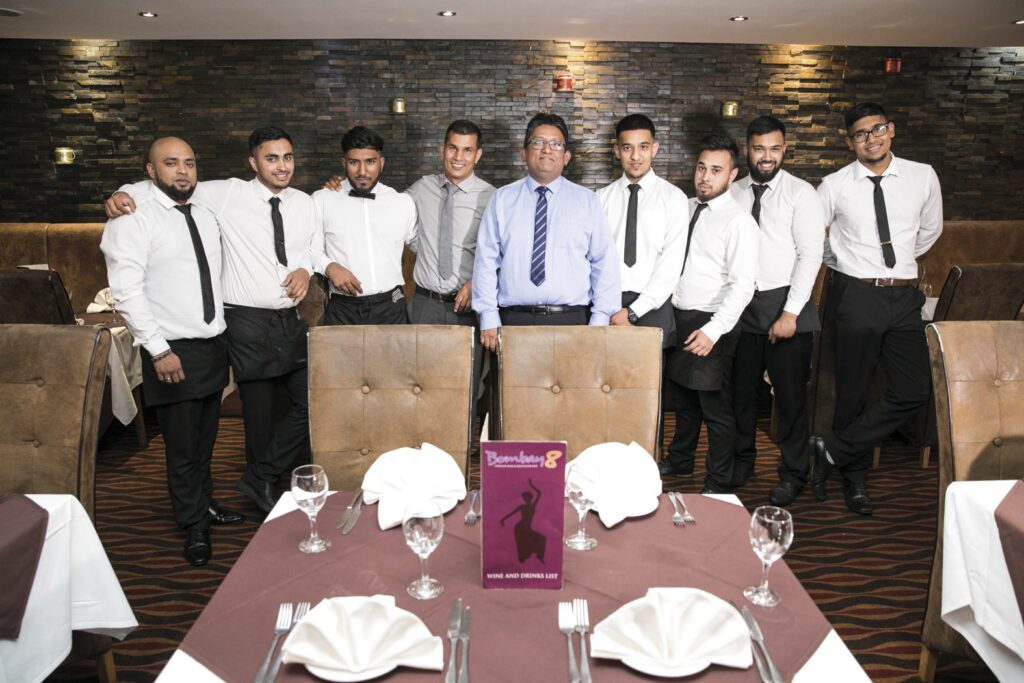
“It also saves them from venturing out into the town for food. They stay at the Travel Lodge, eat here, then often go over the road to the pub for a few drinks afterwards!”
Mofozul is proud of his restaurant’s popularity and believes it’s down to two things. First, it’s the quality of his food, and secondly the quality of his service. The restaurant always employs more staff than they need, this way customers are always attended.
“I like to employ extra staff on each shift. It’s more expensive I know, but it’s better to have too many people than not enough. A poorly staffed restaurant usually suffers from a customer service point of view. I never wanted that to be the case here. It’s an investment at the end of the day, an investment in people.”
Bombay 8 wasn’t the first restaurant that Mofozul owned, he previously ran one called the Golden Viceroy, but said his heart wasn’t in it. It wasn’t until he opened Bombay 8 with his business partner that he truly felt accomplished.
“I can safely say my heart is in it now. This is just right. My best friend and my wife really helped me get to where I needed to be with this restaurant. So I’d like to thank them both. I’ve always been an entrepreneur; you see I was always more of a grafter than a natural academic. But Bombay 8 is where things really fell into place.”
After learning the history of Bombay 8 we were looking forward to experiencing the food. The establishment has a reputation for quality and freshness and is one of those Indian restaurants that’s simply on another level to what most people know. At Curry Life we believe it’s our mission to identify these restaurants and feature them in the magazine.
As we often do, we asked Mofozul what he would recommend. He advised us to order from the Chefs Specialities part of the menu, telling us that each dish was carefully crafted to stand out from the rest. So that’s exactly what we did.
Each member of our party had different tastes when it came to curry, so we ordered a range of dishes in an effort to experience the full spectrum of the chef’s talents. Every single meal exceeded our expectations considerably. We knew we were in for a treat, but they still managed to surprise us.
To start we were provided with papadums and a range of chutneys, but we were also provided with spicy papadums as well as regular ones. Mofozul explained that most people don’t know about spicy papadums, but once they do it’s hard to go back to regular ones. We can confirm that he is correct.
We also ordered a Bombay special mixed started along with the vegetarian version too. This allowed us to try a range of different meats and other appetisers such as onion bhajis and vegetable samosas. Naturally, we also ordered a round of Cobra Beer too.
For our main meals the first one we ordered was the Chicken and Malai Kofta. We were expecting this to me similar to the kofta that was served as a starter, just a more significant portion. But instead we were pleasantly surprised by its presentation – and even more so by the taste.
At first glance, the meal looked more like an Italian dish, due to the red curry sauce, meatballs and cheese. But upon trying the sauce and recognising the tandoori herbs and spices, we realised that this dish was indeed distinctly Indian/Bangladeshi. If you’re someone who cannot decide between chicken and lamb and wishes to try something unique – this will be for you.
The next dish we ordered was the Lamb Chilli Fry, pieces of lamb pan cooked with green chilli, mixed peppers, sweet chilli sauce, onions and coriander along with a salad garnish. This was simply superb and will be the dish we’ll all order when we next visit Bombay 8. It was also just the right level of spice. The member of our party who ordered it described it as “the best curry he’s ever had” – And he eats plenty of it!
The next two dishes we ordered were the Malibu Chicken and the Moducash Murgh. Both were mild creamy chicken dishes. If you’re the sort of person who likes to order a korma or a pasanda, we’d recommend you try one of these dishes instead. The Malibu Chicken contains coconut like a korma, while the Moducash Murgh is made with mango and cashew nuts and is similar to a quality pasanda.
Before we arrived, we discussed our love of king prawns with Mofozul on the telephone, but we didn’t actually order a dish containing any when we looked at a menu. We were enticed by other dishes instead. Mofozul had planned to cook us a King Prawn Palak, as it’s one of the restaurants signature dishes. So when our main meals came, he brought us one of these as an extra.
We’re glad he did, each king prawn was mouth wateringly marinated in tandoori spices and barbecued to perfection. It was a wonderful addition to our meal, and we’d order it again in a heartbeat. It was cooked to absolute perfection.
We visited Bombay 8 as the UK lockdown was easing, so we asked Mofozul about the impact of COVID-19 on his business. He told us that he closed for four weeks while they planned what to do, but then reopened as a takeaway only service. His suppliers all increased their prices, but Mofozul decided against doing this himself, believing it would be unfair on his customers.
He told us that as frustrating as this was, ultimately it was better to keep prices where they were and absorb the cost. As any increase in price risked putting customers off visiting. However, he did tell us the government’s bounce back loans and support have helped.
Mofozul also told us about how he was able to keep employing all his staff, “I encouraged my team to share shifts between them. This was preferable to making any redundant or furloughing them. This way they could each work, just sadly less hours than normal.”
Although he did permit his staff to get a second job if they needed one. Promising to help them adjust their hours to accommodate both jobs. This allowed him to keep all his staff employed and not lose anyone.
We asked Mofozul about the Eat Out to Help Out scheme, specifically if he was using it and if it had been helpful. The answer we received surprised us very much.
“I didn’t take part in the Eat Out to Help Out scheme. I considered it very carefully but, in the end, I chose not to take it up.” Bombay 8 was the first restaurant we had visited that had decided against using the government scheme, so we asked Mofozul to tell us why he reached that decision.
“I felt it just wasn’t right for our regular customers. Let me explain, our regulars know they are always welcome. They will always have a table here. We know them and they know us. The Eat Out scheme meant that restaurants were incredibly busy. This is great for the industry, but the problem for us is that it meant we’d risk needing to turn away loyal repeat customers.”
He went on to say, “If we were too busy, we’d struggle to offer them what we usually do. This virus will be gone one day, and so will the government measures to help restaurants. When that happens, I wanted to make sure my regular customers knew we were still there for them.”
“My regulars love our curries, once they were free to go to restaurants again, we knew they’d want to visit us. The idea of us being too full to accommodate them simply wasn’t worth doing. Yes, we could have filled our tables and taken advantage of the scheme, but in the long term, we would have risked alienating those who really valued and stuck by us.”
“Getting a table anywhere during the scheme was difficult. We’ve actually managed to cater for a number of people who may not have visited us otherwise. Their regular favourite restaurants were fully booked, but when they came to us, we were able to fit them in. They were grateful and will now visit again.”
“You’ve got to realise what’s really important in times like these. To me, that’s family and that’s how we see our customers.”
Bombay 8 Indian Restaurant
Gemini 8, Charon Way,
Westbrook,
Warrington WA5 7YA
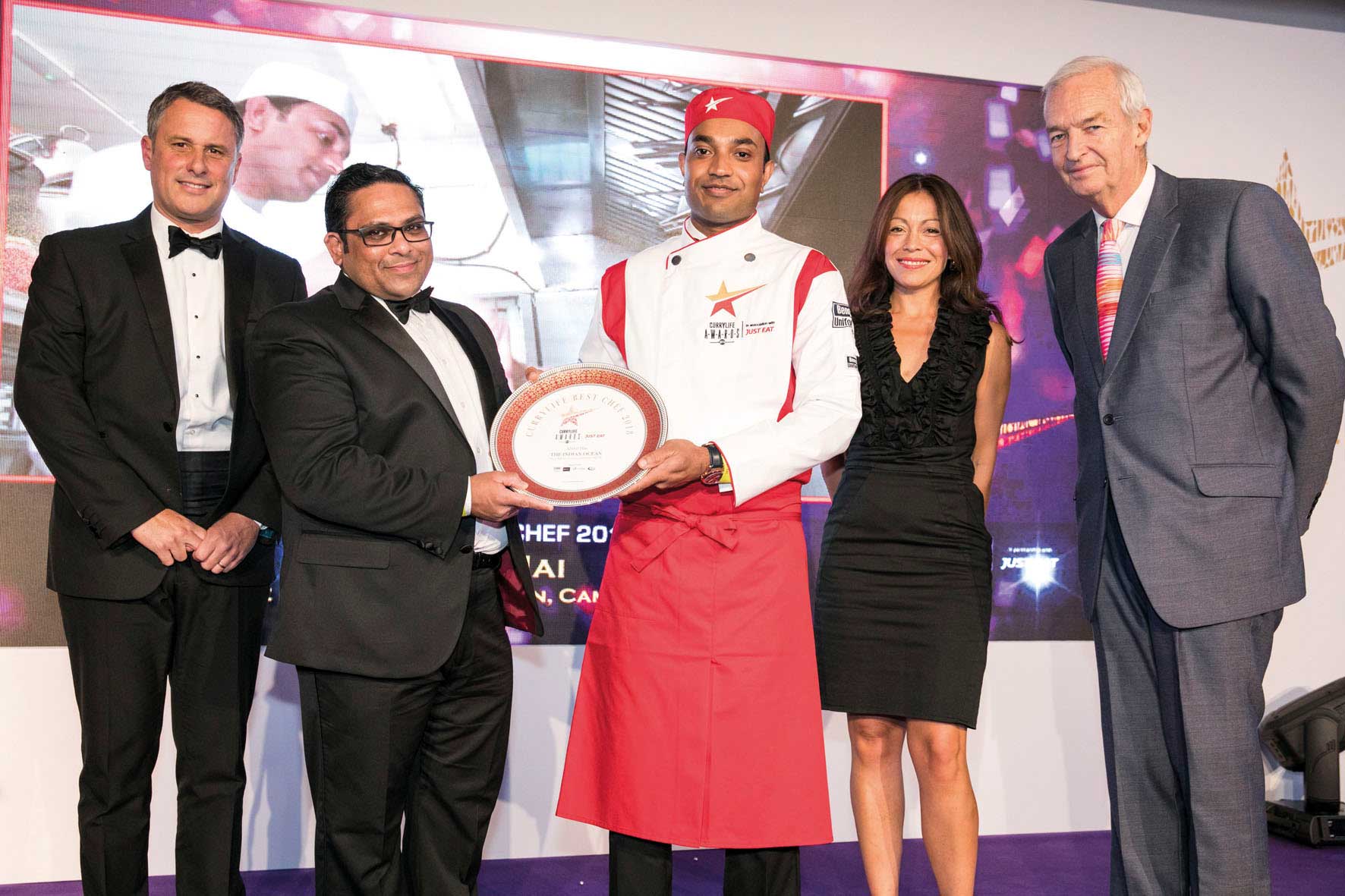
The Indian Ocean Traditional meets modern cuisine
The Indian Ocean Traditional meets modern cuisine
The bustling village of Histon in Cambridgeshire is famous for its apple orchards, beautiful village greens and popular graphitis. And, the forward-looking community thrives in bonding between young and old not only through farming, art and culture, but The Indian Ocean’s traditional yet modern curry.
Nestled in the dramatic landscape of Histon village in Cambridgeshire, The Indian Ocean restaurant is buzzing with life as the clock ticks five, every evening. The restaurant functions from 5.30 to 11pm but early arrivers from the village and neighbouring areas can settle in, order a drink and have a look at the menu. I was among them, who spent the next few minutes exchanging pleasantries with owner Ruhel Hoque, his staff and customers alike.
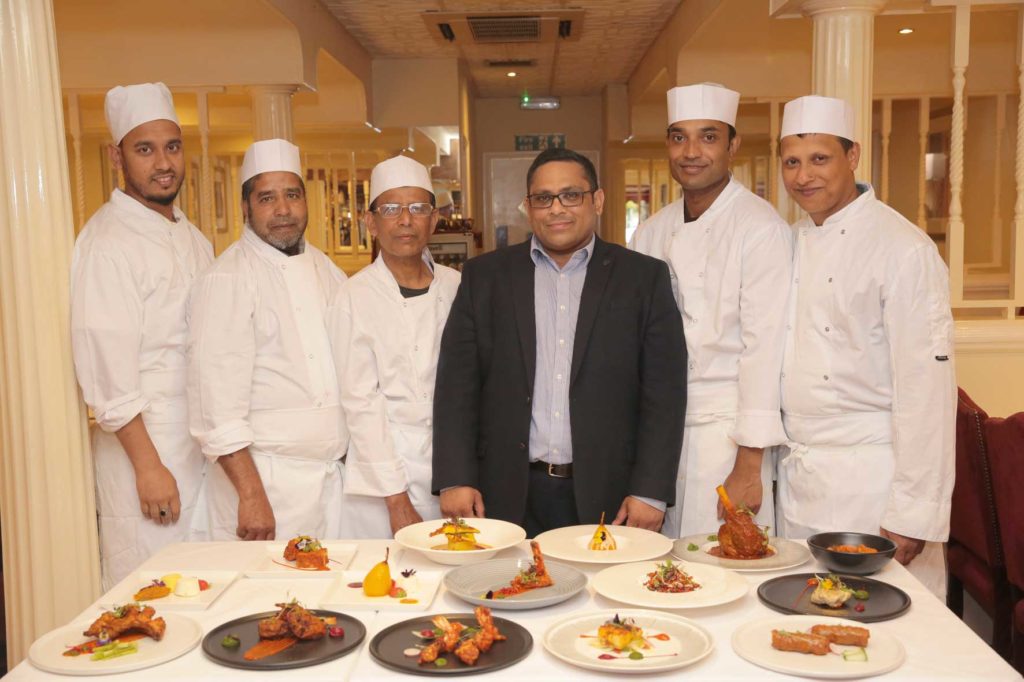
The curry house first opened its doors back in 1996 as Abidul Hoque, Ruhel’s father, bought the place to start his fourth restaurant. With successful ventures namely Balaka in Manchester’s Sale, Surma Tandoori in Ely and Kushiara restaurant in Saint Ives, Cambridgeshire, Indian Ocean beautifully sums up the legacy and contribution of Ruhel’s beloved father.
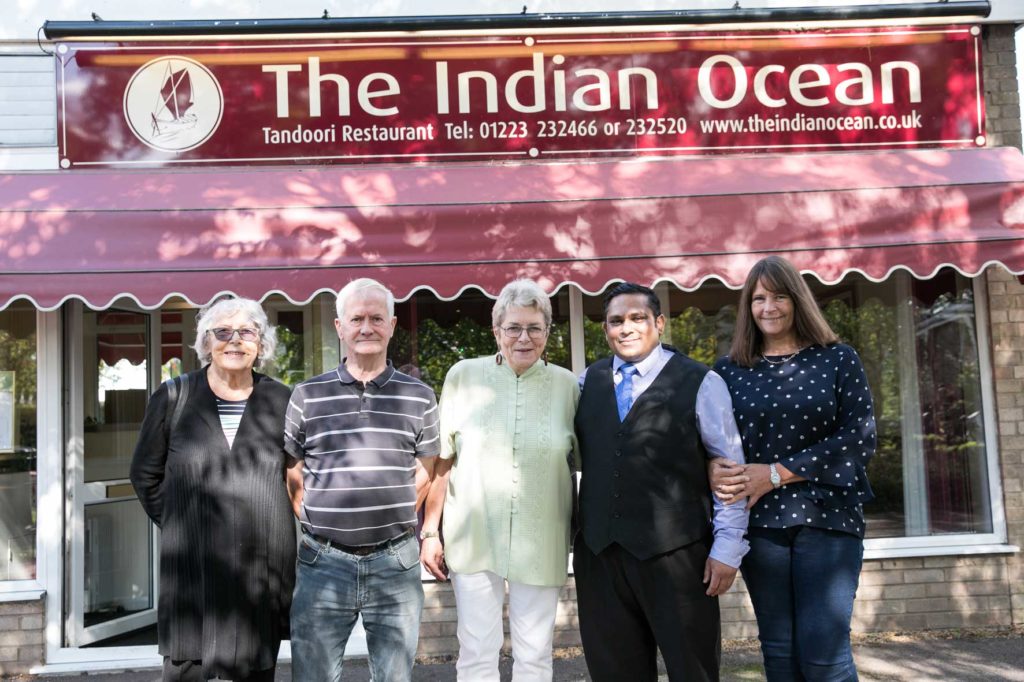
“My dad would have been incredibly proud of me with the way I’ve taken this business forward,” says an emotional Ruhel about his father who came to the UK in the 60s and began working in the housekeeping department of The Savoy Hotel, London and eventually moving into the kitchen. “He worked with some really good chefs in the industry from whom he picked many skills and built on experience in famous restaurants such as Dilchad, Veeraswamy among others. He started his own restaurant in Sale, followed by Ely, but success came knocking on his door when Surma, his second venture, featured in the Michellin guide. That also led to his third venture – Kushiara,” says the young restaurateur.
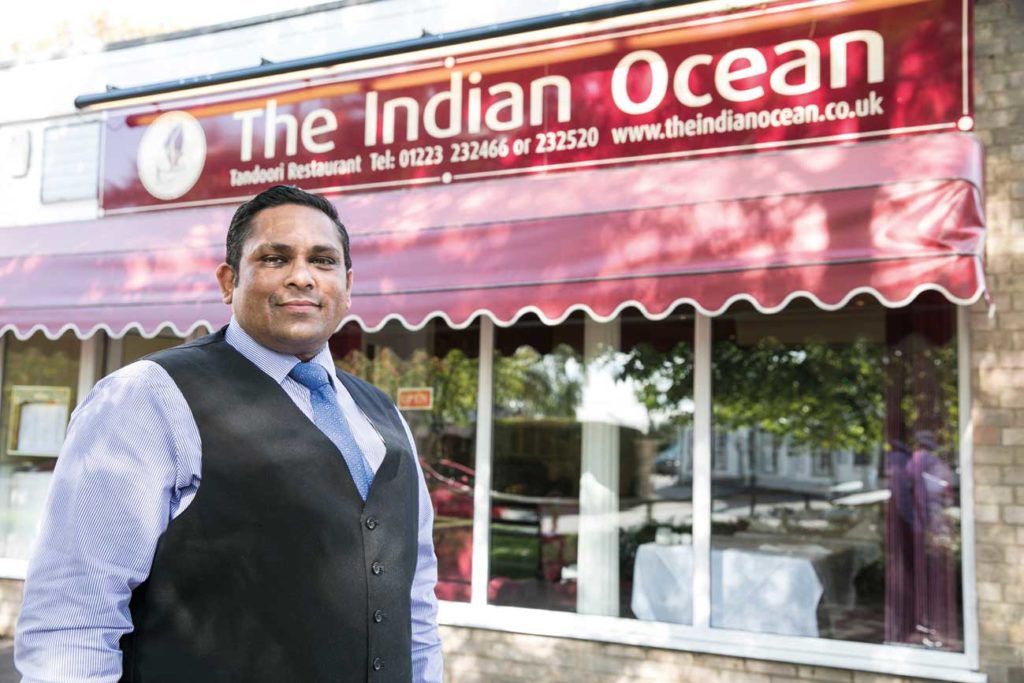
Interestingly, the restaurant names have always had historic and cultural significance. The Indian Ocean trade zone has been a key factor in East-West exchanges throughout history. Back in the day, it was considered a dynamic zone of interaction between peoples, cultures, and civilizations. Similarly, Surma and Kushiara are two important rivers in Bangladesh, which support and sustain livelihoods and bring prosperity.
The décor in the restaurant is creamy white which gives a soothing feel, while a touch of red adds to the warmth. The 56-seater restaurant serves “traditional British Indian food” cooked using modern techniques but preserving authenticity. High quality produce, creative chefs and use of technology has turned the restaurant into a winner with some of the best dishes in town.
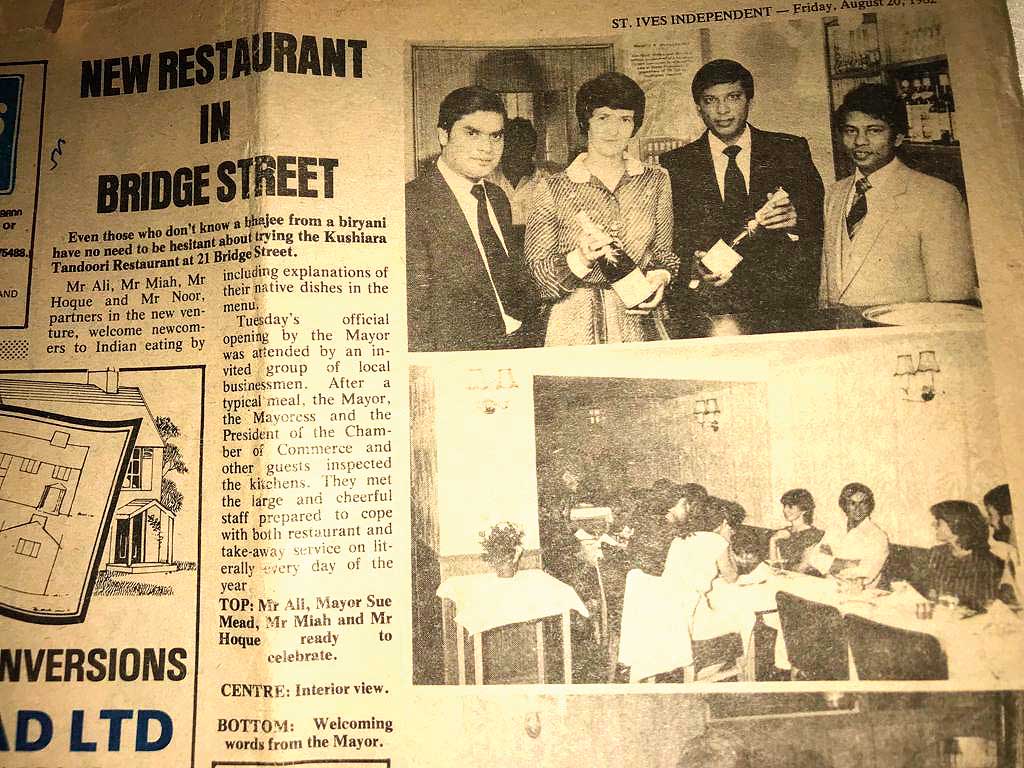
The platter of starters, which had Peshawari Lamb Chops, Malai Tikka, Sheekh Kebab and Paneer Tikka was absolutely delicious. The spices in apt proportion and the meat cooked to perfection was paradise on a plate! The food was indeed delectable, and my curiosity led me to the kitchen. To say I was surprised was an understatement. It was the technical aspect of the kitchen that particularly impressed me.
The kitchen is big enough to hold an elaborate stove and burner range, with ample space to accommodate utensils full of freshly prepared sauce, a commercial tandoor oven, separate worktops and cutting and chopping areas. Interestingly, the tubs of freshly prepared spices were placed at a 30-degree angle to give the right gradient while scooping out the powders, and the serving plates and spoons all within the reach of the chef for a feasible and speedy cooking time. The additional appliances and equipment sat neatly on the shelves above the chopping area.
This tested and proven plan, according to Ruhel, reduces wastage of time, improves productivity, eliminates unnecessary hard work while all the cooking takes place in tandem. Thanks to his engineering degrees and five years on the job, from where he gained the skills and techniques.
Chef Abdul Hai, who was awarded the Best Chef 2018 award from Curry Life, has been with them for over 5 years and his attention to detail and drive for perfection has contributed to the flourishing business. Their specialities include Murgh Makhani, Meen Moilee and Lamb Shank. The Murgh Makhani had a pleasant amount of spice which was well-balanced with fragrant steamed rice. The Lamb Shank was flavoursome and practically fell off the bone, and I learnt it was cooked over little over 6 hours for the right amount of tenderness.
Before I was going to dig into a bit of all these dishes, a quick chat with few other diners in the restaurants revealed they were regulars and had tried almost everything on the menu. One such couple, John and Lin Woodley, who have been visiting since Ruhel was a youngster, vouch for The Indian Ocean as the best curry house in town. Speaking fondly about Ruhel’s father, John says, “I remember Hoque as a loving, family man who was smart, hardworking and generous. It was a pleasure knowing him and working with him as well.”
John’s previous job as a builder bagged him the project to convert a store in Bridge Street into Kushiara Indian Restaurant. “Oh well, it was quite a task as I had not worked on any Indian restaurant projects previously. Also, there were two other business partners, and everyone wanted different things, so that didn’t help the case either,” he quips. Lin, his wife, says, “There are many Indian restaurants around, but none up to this standard. The food is well presented, potions are good and price wise fairly reasonable. There’s something for everybody, and you can have it customised, according to taste and as per liking.”
“What we really like about Ruhel is he has picked a lot from his dad,” they both agree. Ruhel’s father played a pivotal role in the structure and function of his business. Till date, the restaurant follows most of his recipes and goes by the exact ingredients and quantity. The chefs in the kitchen too were trained by his father. So, the legacy of food continues with the best flavours and modern techniques. But when it comes to technology, Ruhel has incorporated his own simplified ordering and collection system, stock update software and ePOS systems.
“I have been studying the problems and shortcomings from an engineer’s point of view,” the engineer-turned restaurateur, who was born in Manchester, says, adding, “It is imperative to automate processes and upscale kitchen processes and simplify production of food preparation.”
Breaking away from a stereotype comes with its own set of challenges. A lot of curry houses like to continue with age old practices of food service and hospitality and follow their own traditional way of functioning. With tight immigration rules and policies, it is time to step up with better techniques and equipment as the industry is surviving on borrowed time. The important aspect of running a business is not in just identifying the problem but coming up with a solution too.
Computerised steam combination tandoor ovens are the solution for skilled tandoor staff. The tandoori oven is tough and not everyone can get it right. “The past few years have been excruciating with the rise in staff shortage more specifically tandoori chef. While researching for cooking aid, I chanced upon this and felt this could be a solution to the problem. I think this is the best investment I have made. There is no need for tandoor chef nor sous chef,” he says.
About growing and expanding in terms of number of restaurants his vision is clear. “I believe in investing time and effort in one place rather than having many but not being able to attend to them personally. Moreover, with staff problems, it is important to consider all factors before making commitments.”
The Indian Ocean
Unit 4 High St, Histon,
Cambridge CB24 9JE
Tel: 01223 232466
theindianocean.co.uk
Read more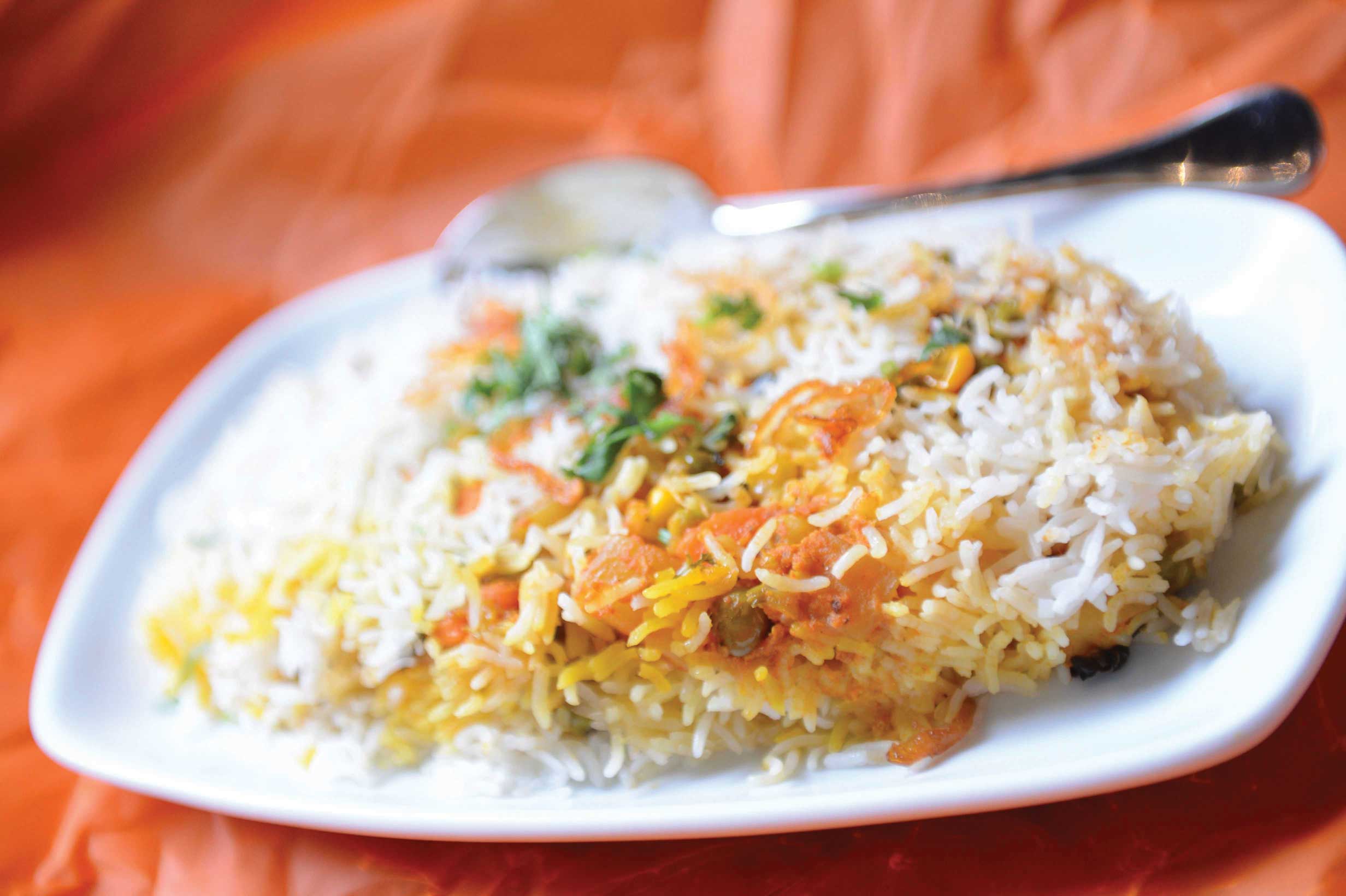
Eating more rice could help fight obesity
Eating rice could help prevent obesity, a Japanese study has found. According to a Bloomberg report, researchers from the Doshisha Women’s College of Liberal Arts in Kyoto said that people following a Japanese or Asian-style diet based on rice were “less likely to be obese” than those living in countries where the consumption of rice is low.
The researchers added that even a modest increase of 50 grams of rice per day could help to reduce the worldwide prevalence of obesity by one per cent — from 650 million adults to 643.5 million adults.
They noted that low-carbohydrate diets limiting rice are a popular weight-loss strategy in developed countries, but the effect of rice on obesity was unclear.
The study examined rice consumption — in terms of grams per day per person — and calorie intake in 136 countries, as well as data on body mass index (BMI).
In the U.K., people were found to consume just 19 grams of rice a day, below dozens of other countries including Canada, Spain and the U.S.
“The observed associations suggest that the obesity rate is low in countries that eat rice as a staple food,” said Professor Tomoko Imai, who led the study.
Giving possible reasons why rice can help, Prof Imai said rice was low in fat, adding: “It’s possible that the fibre, nutrients and plant compounds found in whole grains may increase feelings of fullness and prevent overeating.”
“Given the rising levels of obesity worldwide, eating more rice should be recommended to protect against obesity even in western countries,” Prof Imai was quoted as saying.
The authors of the study concluded: “The prevalence of obesity was significantly lower in the countries with higher rice supply even after controlling for lifestyle and socioeconomic indicators.”
Tam Fry, chairman of the U.K.’s National Obesity Forum, said: “We have known for centuries that Far Eastern populations tend to be slimmer than in the West because rice is a staple food, but few obesity specialists may have appreciated why. This novel research is the first to hypothesize that we could nail obesity by eating a modest amount more.”
The study was presented at the European Congress on Obesity in Glasgow.
Rise of the Indian Jackfruit

Indian jackfruit is about to take its rightful place as a versatile and healthy option on the menus of innovative chefs across the UK
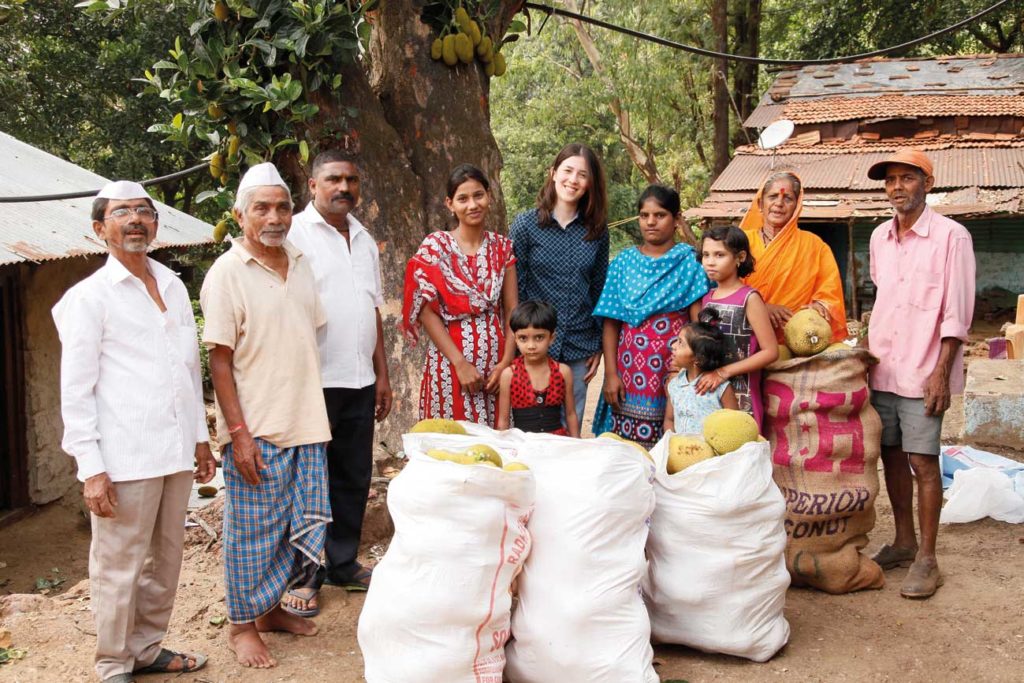
In 2011, when she was a pre-med student, Annie Ryu, travelled to India to implement a maternal and child healthcare program she’d developed with her brother Alex. When she saw her first jackfruit at a street vendor’s stall, she was immediately intrigued. Why had she never heard of this huge, green, oddly studded fruit that was a dietary staple here in South and Southeast Asia? She set out to learn more, and what she learned was this: despite it’s many nutritional and ecological benefits, the majority of jackfruit grown in India was going to waste.
The jackfruit tree is wholly adapted to its environment—resistant to high temperatures, drought, and easy to grow. Because it doesn’t need to be replanted each year, it’s more viable for farmers to plant additional trees for future investment in their supply chain. The jackfruit itself can grow to a whopping 100lb and is nutritionally dense. It’s high in sustaining fibre and low in calories. The immature jackfruit is flavourless and has a meaty, firm texture. When not stored in water, it keeps its meaty texture and absorbs seasonings and sauces easily.
Annie realized that jackfruit had potential that matched its size—to not only improve our diets and health, but also the livelihood of local farmers, and ultimately, the well being, of the planet. In 2015, she launched The Jackfruit Company: building distribution systems, improving market opportunities for farmers, and creating a working international supply chain to make jackfruit more available around the world. It is now one of the fastest growing companies in the natural foods sector in the US and the global leader for jackfruit products and farm-to-market supply chains.0 retailers in the United States.
The Jackfruit Company now works with over 1,000- farming families in India to harvest jackfruits and the final production process takes place in a $1m BRC A rated factory. They supply over 6000 retailers in the US with deliciously creative, 100% vegetarian dishes, all natural, easy to prepare, and all featuring jackfruit as the primary ingredient.
Food service is also extremely important to the company, particularly given the drive to get jackfruit to a bigger audience. “We’re focused on how to get jackfruit on restaurant menus and in corporate and college cafeterias, to be able to get jackfruit to people who are looking to eat plant based periodically or routinely. Any new product where you currently see meat is a place where jackfruit could be,” says Annie.
Ryu’s mission goes beyond just business: she’s making good on her promise to help farmers in India. “We’re estimated to be contributing 10 to 40 per cent of the annual income of the farmers that we work with,” she says. In the face of climate change, the fruit’s nutritional properties make it a viable and sustainable alternative to imperilled staple crops like wheat and corn—as well as a popular meat substitute which is whole food, not highly processed. Ryu sees it “Replacing meat with a fruit that grows on trees, is superabundant, thrives without agricultural inputs, and is nutritious and satisfying to the consumer-this is a fundamentally scalable solution to multiple global problems.”
The Jackfruit Company will be launching in the UK this summer, working with Buckley & Beale, a UK importer and distributor. Noreen Finnamore, Managing Director, says “We are very excited to be working with The Jackfruit Company to bring top quality jackfruit directly from India to the UK in a convenient and resource efficient format for food service. We also hope to import ripe jackfruit once we have established that there is a demand for it.” The initial offering to food service will be catering size pouches of 100% unseasoned young Indian jackfruit – no added water, ready to use from the pouch. Seasoned and flavoured catering packs will follow.
All wholesale or restaurant enquiries to noreen@buckleyandbeale.com or the sales team at Buckley & Beale on: 01454 219445.
Read more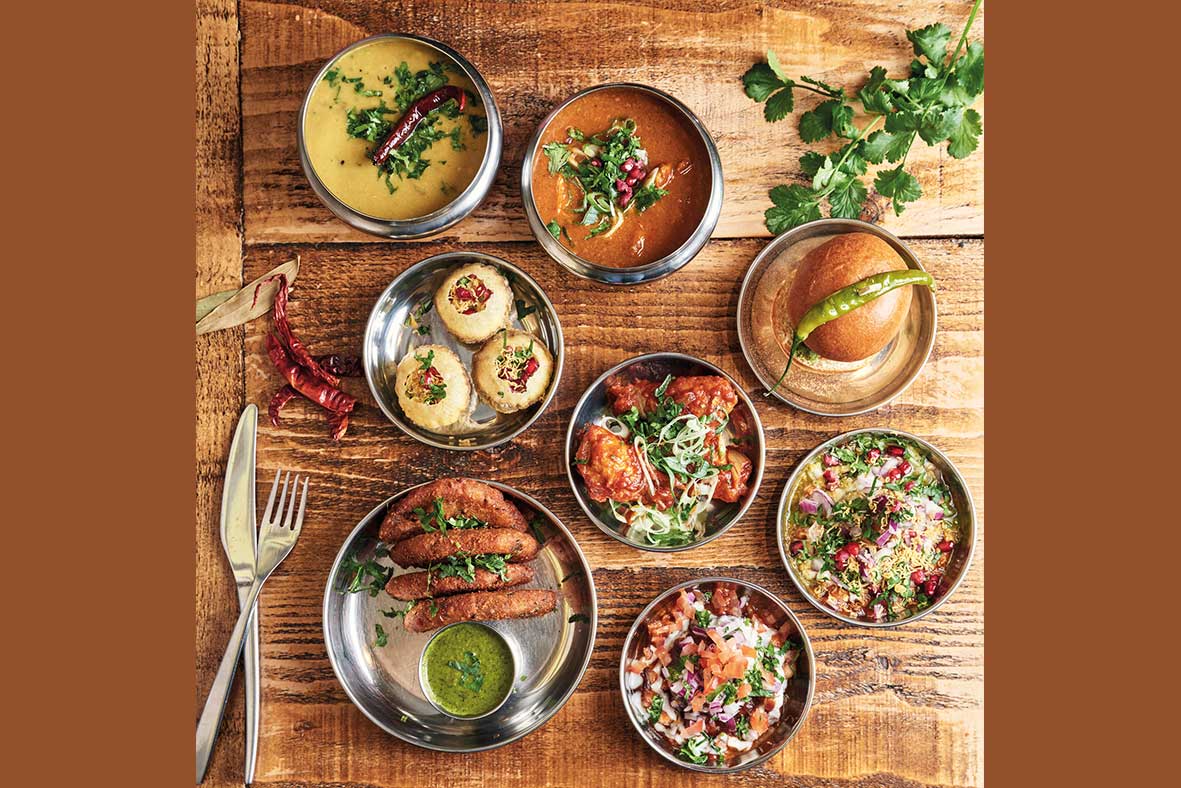
STREETS AHEAD
If you’re a lover of street food – but also enjoy a relaxed and comfortable dining experience – is it possible to have the best of both worlds?
The answer is an emphatic ‘yes’ if you can find one of the few high quality restaurants specialising in street food – and, if it’s authentic Asian street food you’re after, look no further that Chit Chaat Chai in south-west London.
Located in a trendy Wandsworth high street, Chit Chaat Chai really succeeds in its efforts to replicate the feel and atmosphere of eating street food in a restaurant environment.
There are vibrant artworks from Asian artists adorning the walls – and even the thinking behind the name reflects the ambiance the owner, Tania Rahman, wants to create.
Chaat is a type of Indian street food, while Chai means tea, and Chit-Chaat sums up the relaxed atmosphere offered by the restaurant, where diners can enjoy a good chinwag over their food.
It was a fresh Spring day when we visited the restaurant so it was a welcome relief to ignore the snack truck on the short walk from Wandsworth Town Station and settle down in the comforting warmth of the restaurant.
Fresh and comforting was also a pretty good way to describe the food on offer.
We selected a mixture of meat and veggie dishes, as my fellow diner was a vegetarian, and there was plenty of choice available.
The Popeye’s Paneer dish, featuring a creamed version of the cartoon character’s favourite spinach plus paneer cubes and roti, was a particular favourite on the veggie/vegan front – while the one-pot chicken Biryani also stood out, with its Sindhi style chicken curry infused with turmeric, coriander and gram masala, plus saffron rice.
Another dish we tried was the vegetarian Samosa Chaat, which comprised veg samosas topped with chickpea curry, yoghurt, and chutney (or chaatney, geddit!) and was described on the menu as the Queen of Chaats.
Then there was a final tasty meat dish in the shape of some Keema Cutlets – spiced potato patties stuffed with lamb mince and served with a coriander dip – set off by some crispy okra fries lightly tossed in masala.
All in all it was a top meal using fresh, authentic ingredients which gave you the taste of proper street food – and all at a reasonable price in the region of £30 for two people, without drinks which were also reasonably priced. And the thinking behind Chit Chaat Chai seems as equally refreshing as the food itself.The restaurant was opened three years ago as part of what owner Tania Rahman calls her ‘long and fruitless quest to fulfil an insatiable craving for my favourite India street food’ – and following years of experience preparing and serving food in street markets across London.Since then the restaurant has gone from strength to strength, with a consistent 20% growth in revenue each quarter, and Tania picking up a string of awards in the process – including Young Entrepreneur of the Year in the 2018 National Business Awards and Best New Business in the Asian Business Awards.
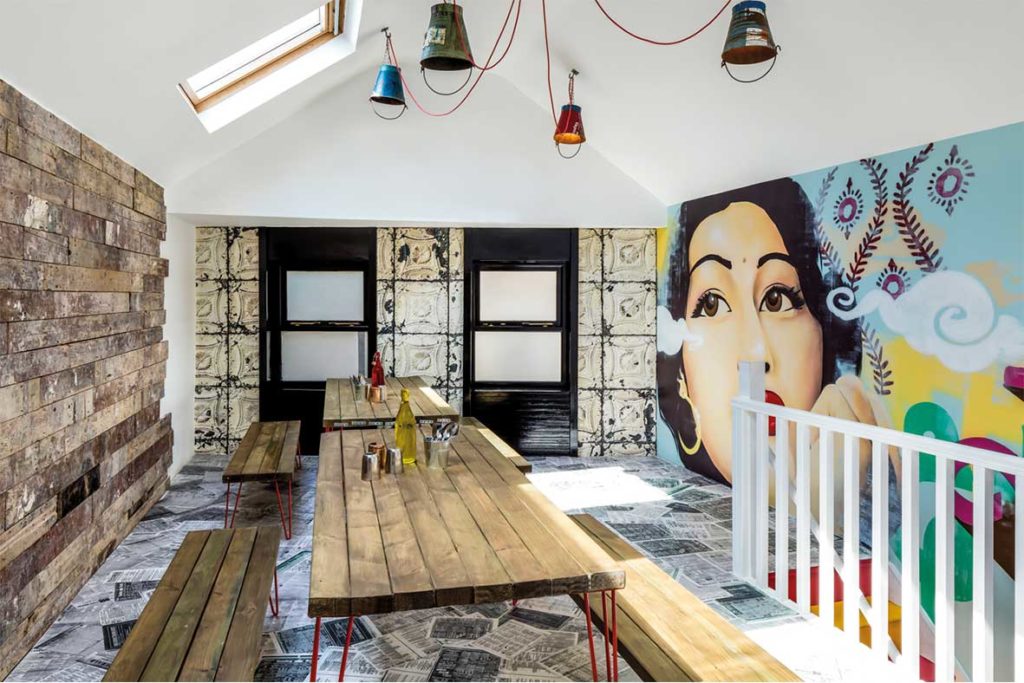
A strong believer in empowering the local community, Tania also works with the Prince’s Trust to offer employment to people on the programme, along with the Hopscotch organisation offering chef internships to out-of-work minority women.
So when it comes to a novel approach to Asian street food, there’s certainly a case for Chit Chaat Chai’s logo to include the motto Streets Ahead.
Chit Chaat Chai is at 356 Old York Road,
London SW18 1SS Tel: 020 8480 2364
Read more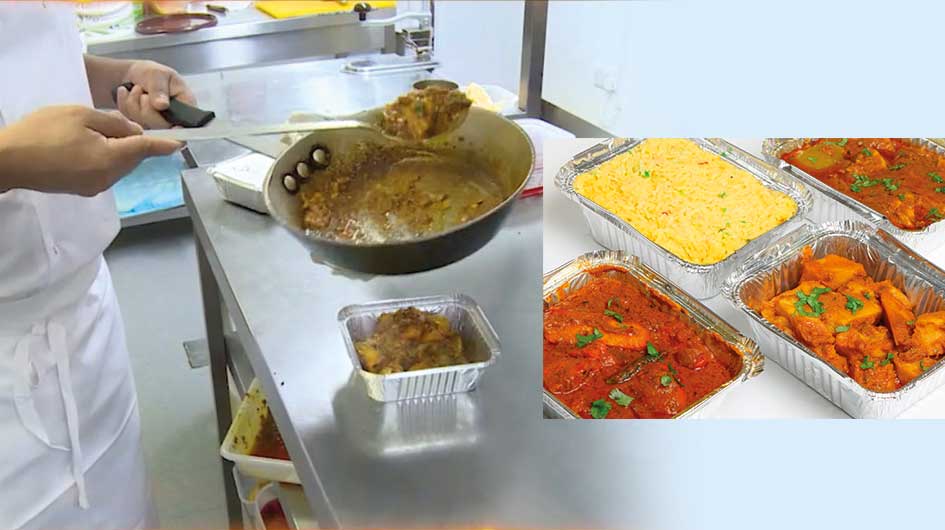
Indian takeaways second on popularity chart in Britain
Indian takeaways second on popularity chart in Britain
In a recent Channel 5 documentary on Britain’s favourite takeaway options, Chinese food was crowned the country’s favourite cuisine, followed by Indian food especially the curry, while fish and chips ranked third. Shockingly, the much-in-demand pizza bagged the fourth spot while the American-inspired burgers came fifth.
Earlier in March, Channel 5 created a stir when it revealed Britain’s Favourite Crisps announcing the top three — Walkers, Pringles and Doritos. Viewers were divided over the results, with many saying Monster Munch should have ranked higher than 11th place.
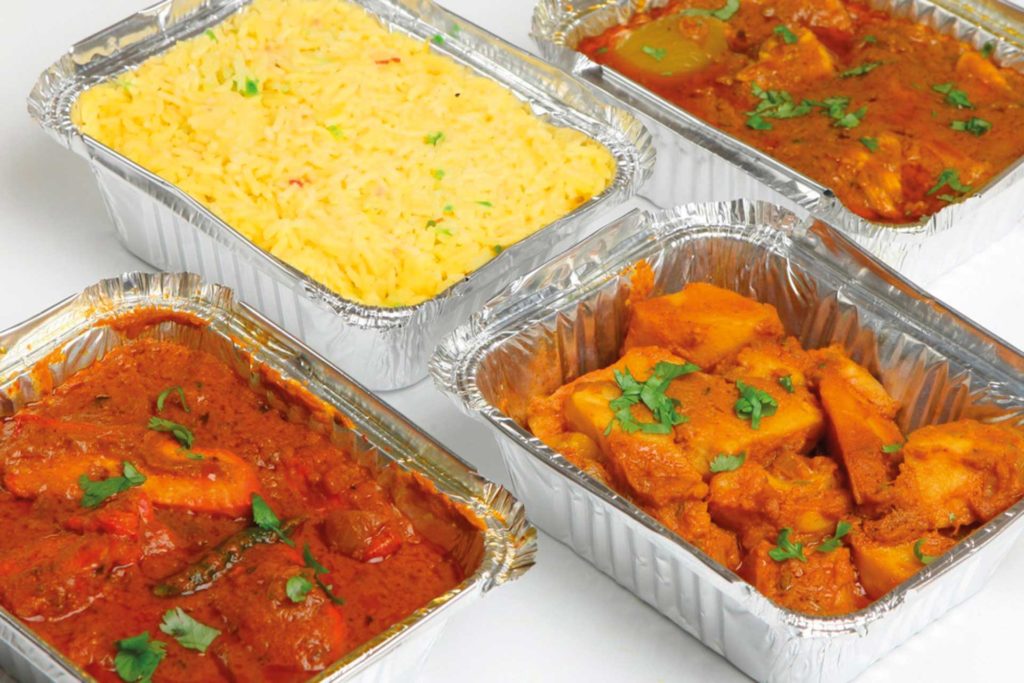
Following the same principle as the previous documentary, the show ‘Britain’s Favourite Takeaway’ ranked 20 of the country’s most beloved dishes.
Researching on the origins of the top favourites, the documentary revealed that the first ever Chinese restaurant in the UK opened its doors in 1908, and immigration from Hong Kong in the 1950s and 1960s made the food even more popular.
It also revealed that one of the most ordered Indian dishes is Tikka Masala, which can be traced back to both India and Bangladesh, though its origin is disputed to this day.
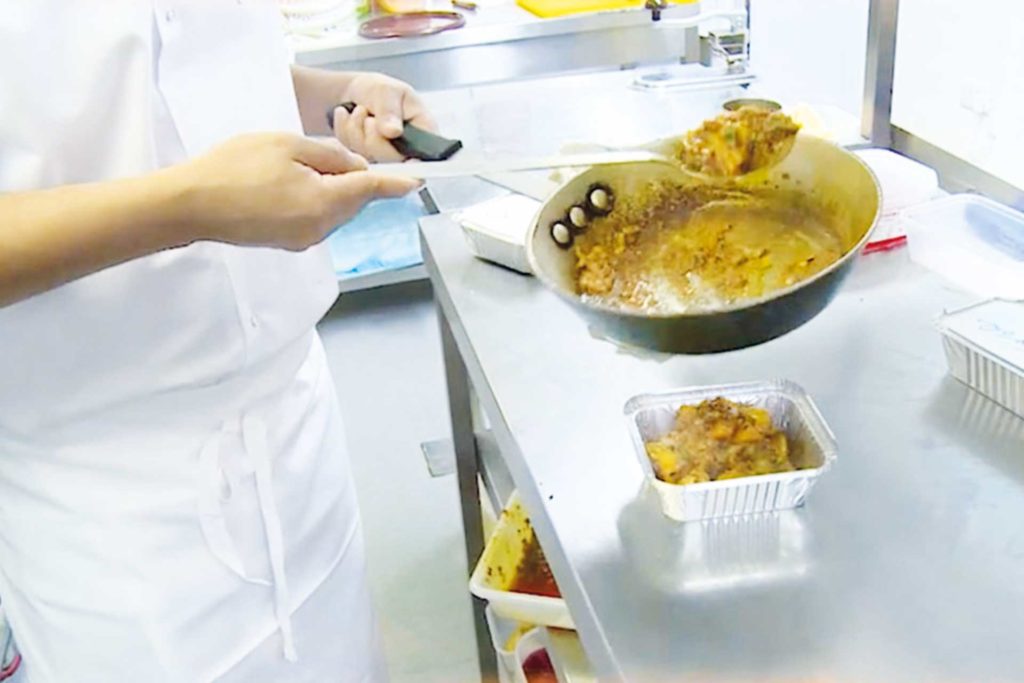
The UK’s beloved fish and chips came third, which might surprise some, as they have been a British staple for the past 150 years. According to the documentary, the iconic dish was deemed so important to moral during the Second World War that they were never rationed.
Coming in at fourth was pizza, which originated from Naples where it was popularised as an affordable and quick dinner option.
Meanwhile burgers came in fifth position, with the most popular options seen to be McDonald’s and Burger King. McDonald’s came to the UK in 1974 and now serves a staggering 3.5 million people all over the country.
Full list of UK’s Top 20 takeaways
1. Chinese
2. Indian
3. Fish and Chips
4. Pizza
5. Burger
6. Chicken
7. Kebab
8. Sandwiches
9. Thai
10. Sausages
11. Bagels
12. Cheese chips
13. Baked Potato
14. Mexican
15. Caribbean
16. Sushi
17. Pie
18. Greek Food
19. Tapas
20. Parmo
Read more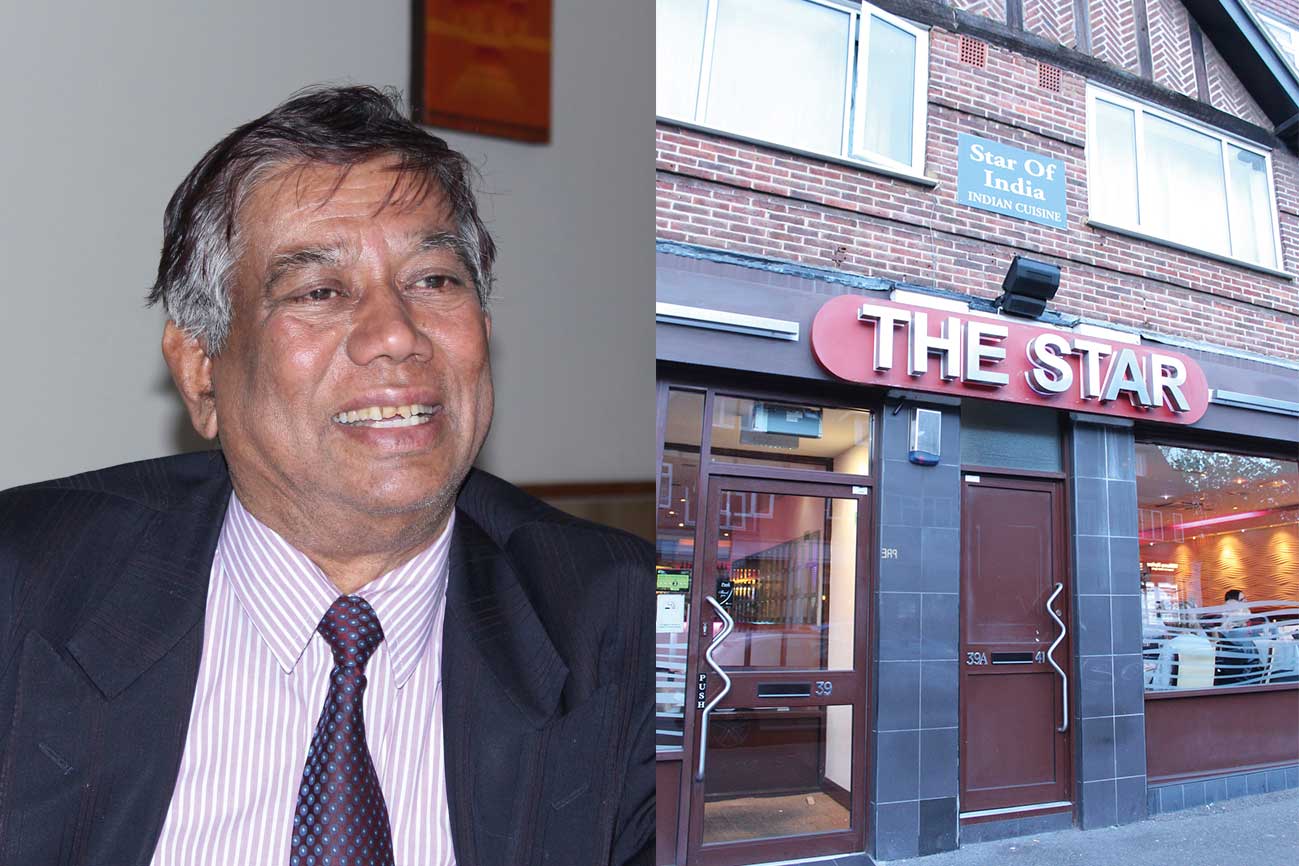
Star restaurateur, a shining example of success
Star restaurateur, a shining example of success
Arriving at Heathrow Airport in November 1962 after a long, exhausting flight from Dhaka is something Mr Abdul Malik will always remember. The flight to London was via what was known as West Pakistan and he was barely a little over 16 years of age. “It was cold and I vividly remember I took a black taxi and went straight to the address in Sussex Garden, given by my relative. After staying there for about five weeks, I took up a room in a flat share with some Spanish housemates in Kingston,” he recalls.
Malik, who is the owner of Star of India, one of the oldest Indian restaurants in South London’s Cheam village tells Curry Life about how life was back then, and the way things have changed in the years gone by. Though he’s partly retired, his restaurant is still a buzzing eatery run by his two sons, despite the challenges the restaurants are currently facing.
Mr Abdul Malik is a popular British-Bangladeshi businessman, known for his contribution to the catering industry in the UK and numerous businesses in Bangladesh. He is a kind hearted and generous gentleman, who is actively involved with Surrey Bangladesh Welfare Association as President, working for the local community and charity events. Back in Bangladesh, Mr Malik is the Chairman of Momtaz Diagnostic Hospital in Dhaka, Chairman of Progressive Life Insurance, Chairman of Malik and Sons Bakery, and Director of Sarina Gas Station.
In the UK, he got involved with the Bangladesh Caterers Association from as early as 1963, barely a year after he moved to this country. Since then he has been actively involved in the catering industry for nearly five decades. He held positions of senior vice president and treasurer of BCA for many years and has also been the President of BCA Surrey region for 12 years. In 2012, he was again elected as the chief treasurer of BCA. The Star of India has been the flagship venue for important business meetings throughout his tenure in BCA. Highlighting issues and addressing concerns faced by the catering industry was one of the primary areas he has kept his focus on. He also held the position of a Director for the UKBCCI, an organisation that aims to improve the trade ties between the UK and Bangladesh.
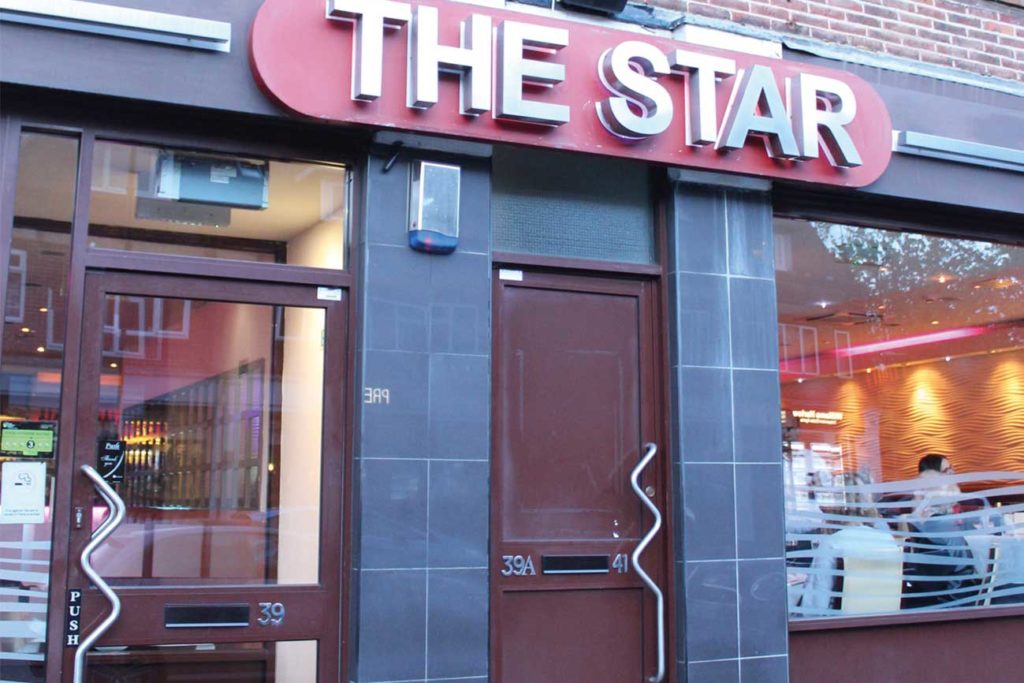
Early Life
For a 16-year-old then, the most obvious choice was study and work. Abdul enrolled in a polytechnic course but the three years there helped him decide he didn’t enjoy being in the “motor mechanics” field. However, he made some good friends there. “My friend and colleague from the course joined Ford as a General Manager, and then went on to becoming the Chief engineer. Before he passed away, he used to come here to see me every month,” he reminisces.
The initial days were tough, but his grit and hard work paid off. “I got a job to do washing up and cleaning in Kensington High Street, at a steakhouse, where I even tried a hand at cooking and grilling. I remember my salary then was £3.50 per week,” he recollects about his two-year stint.
Moving on to a different industry, Malik started working with Miah & Sons, importers and restaurant suppliers of raw freshwater king prawns and shrimps. He worked with them for a few years but his yearning to be in the food and hospitality industry, took him back to the restaurant in Kingston. After gaining experience in different restaurants, Malik decided it was time for him to have his own.
“In 1968, I started a restaurant in partnership in Manchester. After 18 months, my partner wanted to sell out, so I took over the complete business. The restaurant was successful, but I got a better offer and chance in Cheam, Surrey, so I moved here in 1971 along with my family,” he adds.
A new beginning
Moving to Cheam, has been one of the best decisions of Mr Malik’s life. The Star of India restaurant, which serves up authentic Bangladeshi and Indian food, was established in 1971. Taking over an Indian restaurant, which previously housed Café Rendevous, a bar and café, the prime location worked in his favour.
“We stuck to the name — The Star – the same as our previous restaurant in Manchester. And we did shine out. There were not many challenges as I was familiar and confident about the industry. It was a lucrative business, which we were running smoothly as there was not much competition, hence busy on all days, noon and night,” he says.
An experienced chef himself and a good manager, Malik focussed on his restaurant as well as the Bangladesh Catering Association, which he was actively involved with. The restaurant served as a venue for many of their meetings and became the hub to discuss ideas and campaigns for the community.
Then and now
Running the Star of India restaurant for 48 years under the same ownership is indeed commendable. However, things have not always been the same. The challenges these days are far more – right from deciding menus to employing staff.
“The menus were simple and easy – we didn’t have a booklet running into pages back then. Now it is difficult to even remember the variety and types of naan (bread) available, leave alone the kinds of curries,” he points out.
In addition, the struggles of competition between different restaurants and cuisines these days are plenty. “There are about 35 restaurants in the 3-mile radius. We are open only in the evenings as the industry is marred by staff problem. Property prices these days are sky high,” Mr Malik complains.
Looking forward
The business now lies in the able of his sons, who also run another restaurant named Blue Bengal in Carshalton. Jewel and Hellal were born in Manchester and brought up in Surrey and now live in Cheam with their families. After completing their education from Guildford College, it wasn’t easy to convince them into restaurant business, Mr Malik reveals.
“Initially they didn’t want to come to this industry. I really had to convince them to work for themselves and not for anyone and look at the positives,” he says, drawing from his own experience. “When I came to the UK, it was a difficult time and even more difficult to get a job,” he adds, recounting how he first went back to Bangladesh only after five years in 1967.
“I won’t say the future of restaurants is very great. Running the business has its own challenges but at least we have a good family life,” concludes the proud 74-year-old, who has five grandchildren.
Star of India, 39 Station Way, Sutton SM3 8SD
Phone: 020 8722 0533
Read more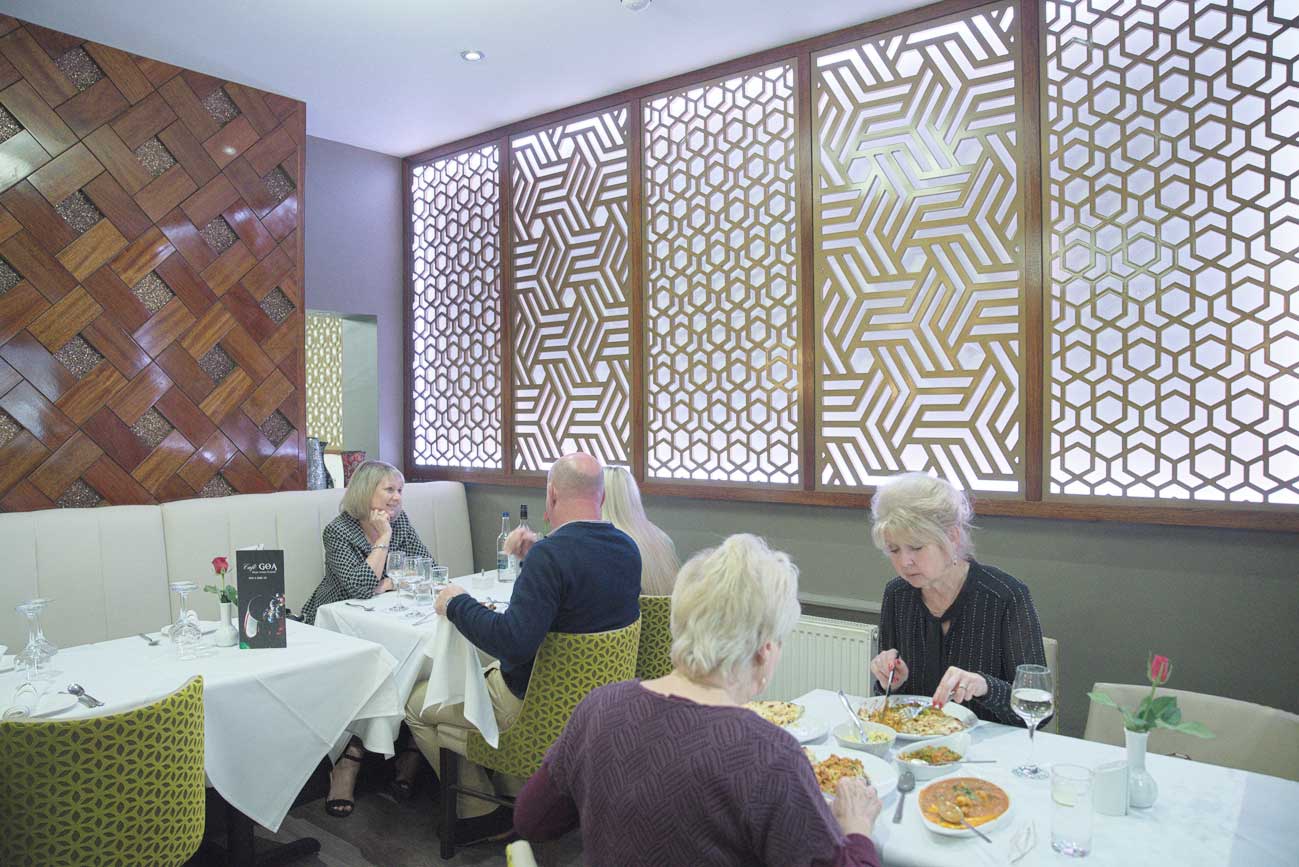
Father-son duo find success in Barton-le-Clay
Father-son duo find success in Barton-le-Clay
A recognised figure in the British Bangladeshi community, Shahanoor Khan is on a mission to get more youngsters involved in the curry industry and make it flourish once again. His latest venture, Café Goa in Barton-le-Clay, was undertaken in response to changing customer demands and revive a traditional curry house, using modern technology, light and décor.
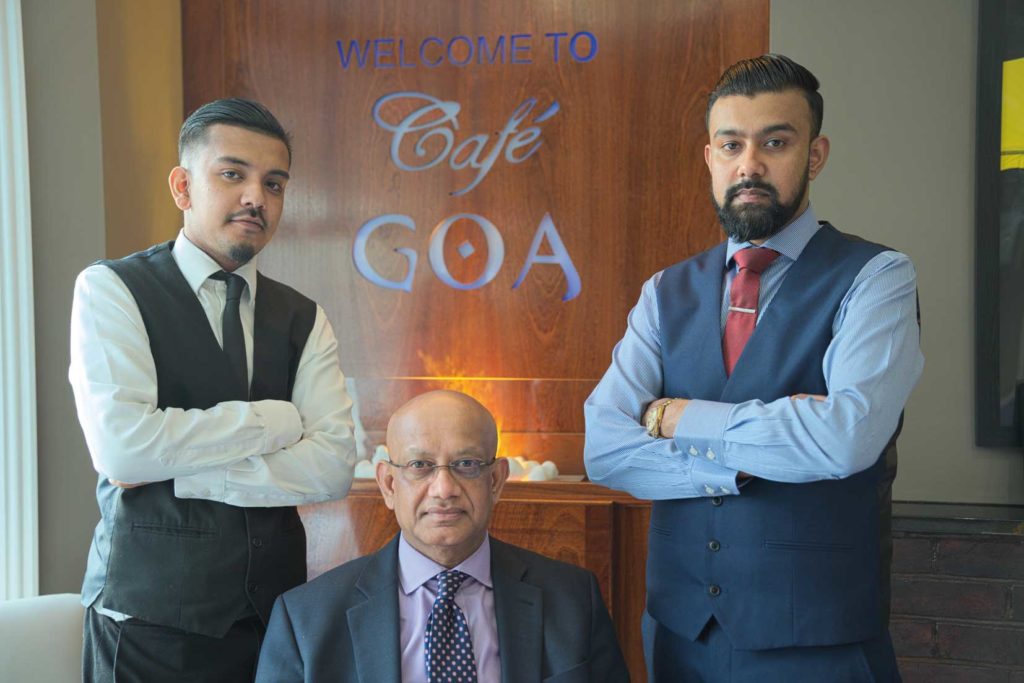
Shahanoor Khan is a well-known figure in the British-Bangladeshi community, admired for his dedication and contribution to longstanding caterers’ associations, which work on challenges in the curry industry. He is the former Secretary General of the British Bangladeshi Caterers’ Association, a platform established in 2015 to unite the curry industry, stimulate creative thinking and confront issues of the day.
Shahanoor’s children – sons Nawaz Sharif and Nibras Abid; and daughter Nafisa Tasnina were born and brought up in London. Nawaz, the eldest of them all, works in the same business as his father while Nibras is completing an apprenticeship. Nafisa will be graduating in Game Development from Kingston University this October.
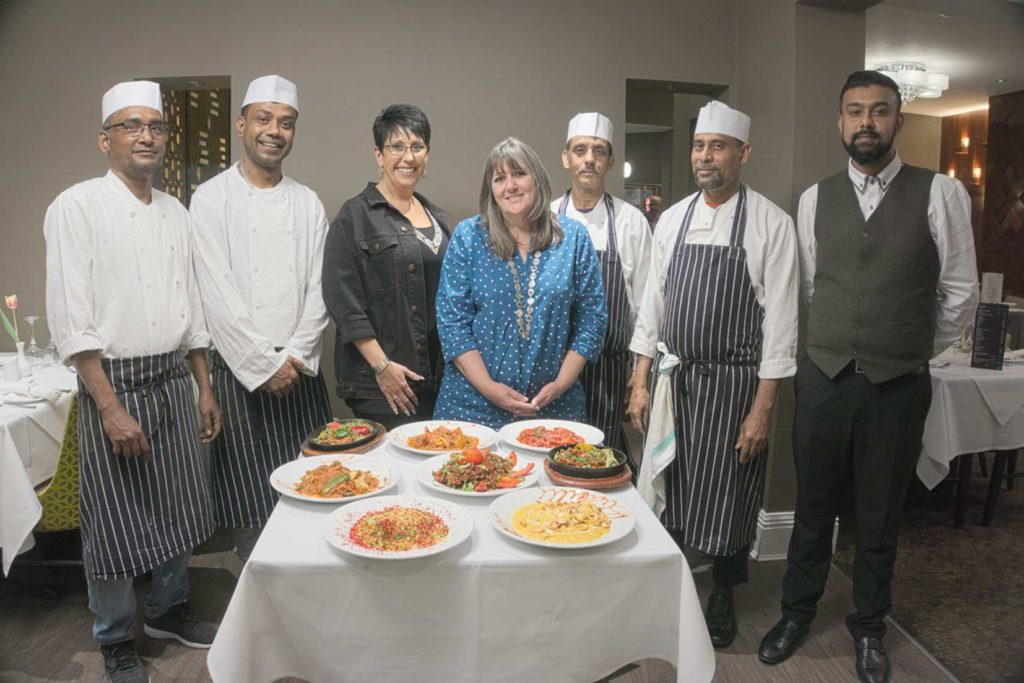
As a child, Nawaz always aspired to be like his father Shahanoor Khan. At 28, he is elated to be working alongside, at their renowned restaurant Café Goa in Barton-le-Clay, a village in Bedfordshire. The father-son duo shares an incredible relationship learning from each other’s experience, knowledge and skills. “I am delighted to be working with my father. I learn something new from him every day and he’s always there to guide me,” says Naz, as he’s popularly known among friends and family.
The decision though to join his father’s restaurant business was not straightforward. It came after years of persuasion. After his schooling in Maida Vale, like his peers, Naz wanted to take the long hard road of going through job applications and interviews before he settled for what he really wanted to do. He started his career as a pharmacist and then moved on to the retail industry, working as a manager in House of Fraser, Central London. His next stint was as an account manager in a medical recruitment agency. Then, after all those jobs, he was eventually convinced by his dad to work for himself.
Café Goa was taken over in January 2016 as the previous owners faced difficulty in running the business. The 80-cover restaurant has recently undergone a massive refurbishment resulting in an exquisite, fine-dining space, giving it a modern contemporary look. With the new look, the ambience is pleasant and comfortable for family dinners or fun evenings with friends. The menu captures the essence of food in India with an innovative touch. All the food at Café Goa is freshly prepared using finest ingredients and quality produce.
The Chicken Irangani, a dish cooked with spiced ginger in a rich sauce and seasoned with natural honey, was absolutely delicious and highly recommended. Another popular dish, which is also a unique speciality is Naz Special, a lamb dish prepared in a homemade bhuna style. If you prefer a creamy sauce, Chicken/lamb Badami is the chef’s recommendation as it’s cooked with spices, nuts and is medium-mild in terms of heat.
The credit for these special dishes goes to their award-winning head chef Saifuzzaman Khan, who’s been in the profession for 18 years now. “I am very keen to try different dishes, and experiment with new flavours and curries,” says Saifuzzaman, who is the creator of the unique dishes — Chicken/lamb Irangani, Badami, Naz Special and Murghi Massalam at Café Goa. “Kitchen job is difficult and highly stressful, but I love the challenge,” he adds.
Unlike other restaurateurs, Shahanoor’s experience has been slightly different after he moved to the UK in 1980s. Though he took up a part-time job as a waiter during his initial student days in London, on completion of his studies, he started a small firm to carry out documentation and paper work for visa purpose, filling forms and applications.
The next venture was a joint business with his brother, where they opened a restaurant in North London. He then went on to start his own restaurant, The Balti House in Tower Hill, running it successfully for 15 years from 1992 to 2007. It was during that time development work commenced around Southwark, and he sold the restaurant.
His next project again was a restaurant in Weymouth. The theme was very interesting and unique then – following more of a street food concept but due to shortage of staff the restaurant was in business only for three years (2007 – 2010). Around the same time, he opened a Takeaway in Dulwich – Spice Republic, which is still under his ownership.
When asked which one he prefers more amongst his current ventures, “It’s got to be Café Goa. The ambience here is great and the customers are very friendly. It’s a small village, so everyone seems to know one another,” says Shahanoor.
Elaborating further, he says, “Both Dulwich and Barton le Clay have different crowds and cater to different kinds of people. Spice Republic is more casual, whereas this has more of a fine dining Indian restaurant feel.”
As the restaurant is located in a village, amidst the sprawling countryside, what are the chances of it being busy? “Oh yes, Wednesday to Saturday the restaurant is very busy and so is the demand for takeaways. Some of our dishes are unique, which makes it different from other Indian restaurants,” the restaurateur adds.
“I am thinking of organising Bollywood nights. People around here are friendly and love socialising, so it will be a good entertainment for them as well. We have plans of hosting charity dinner events too at the restaurant. We recently signed up for a charity dinner for Cancer Research,” he reveals.
It doesn’t end there. Shahanoor has also sponsored Barton le Clay football team. During Christmas, the restaurant contributes to the village lighting.
Shahanoor is also the founding president of the European Probashi Bangladeshi Association EPBA, which has members from 28 European countries. The organisation was established in April 2016, to cater the community and industry demands and challenges in member nations. It helps in networking, building contacts and connections.
About the curry industry, he says, “Only if we encourage more youngsters to come into this industry, will this industry survive. In order to save the dying traditional curry house, we must adopt modern means and ways to help it survive. A lot of these changes comes along with newer and fresher ideas as curry business can be very lucrative, if given a bit of a spin around.”
The ratings and reviews of the restaurant are excellent on all platforms – Google, TripAdvisor and Facebook. “When we took over, the restaurant was almost in shambles – businesswise. We invested a lot of money to renovate the look, quality and service,” the restaurateur says.
“As part of the hospitality industry, service is an integral part of the business. We promote and encourage the younger generation to come into the business. We also have women staff working with us during weekends,” he adds.
Shahanoor is himself extremely cautious about allergens as his daughter Nafisa too is allergic to nuts and dairy products. “We have allergen signs present on the menu and ensure out waiters check with customers about any special requests. People here are generally very aware hence it’s not been a problem so far.”
The 60-year-old restaurateur wants to focus completely on his current venture and how to make the restaurant stand out. So, the expansion plans will have to wait for now.
For Naz, being a part of Café Goa is special and he has no regrets. But if he could change one thing what would it be? “I wish I was lured into this much earlier. If the older generation had brought us into the industry earlier and put more responsibilities on us, things would have been different. But I’m not complaining. I am passionate about my work and wish to continue with the same momentum, just as my dad,” he concludes.
Cafe Goa
2 Bedford Road, Barton-le-Clay,
Bedford MK45 4JU, UK
Tel: 01582 883934. www.cafegoa.co.uk
Read more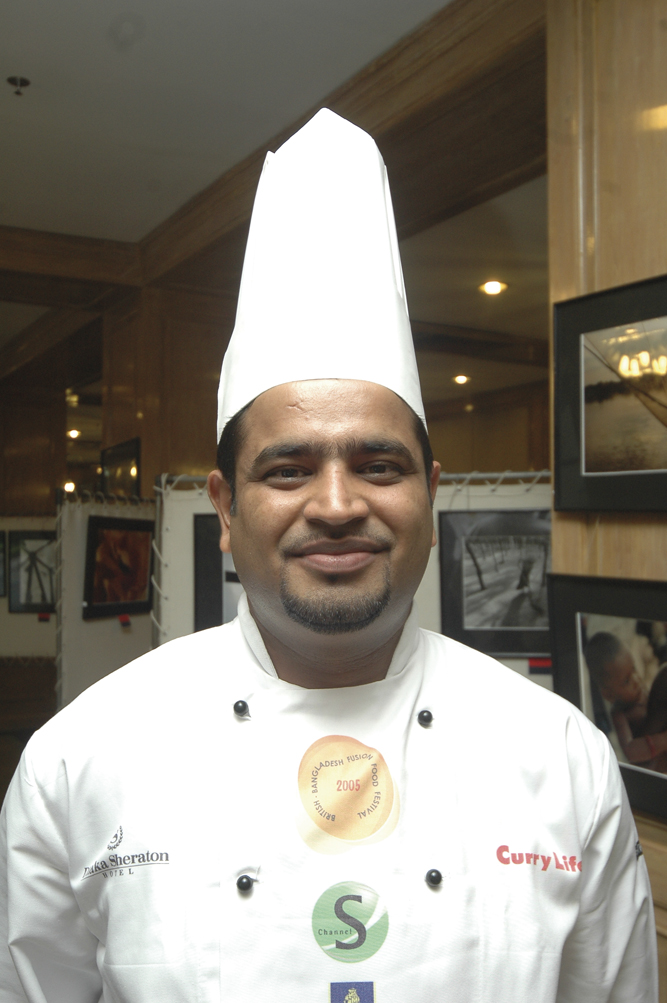
PROFILE OF A MULTI-TASKING ENTREPRENEUR
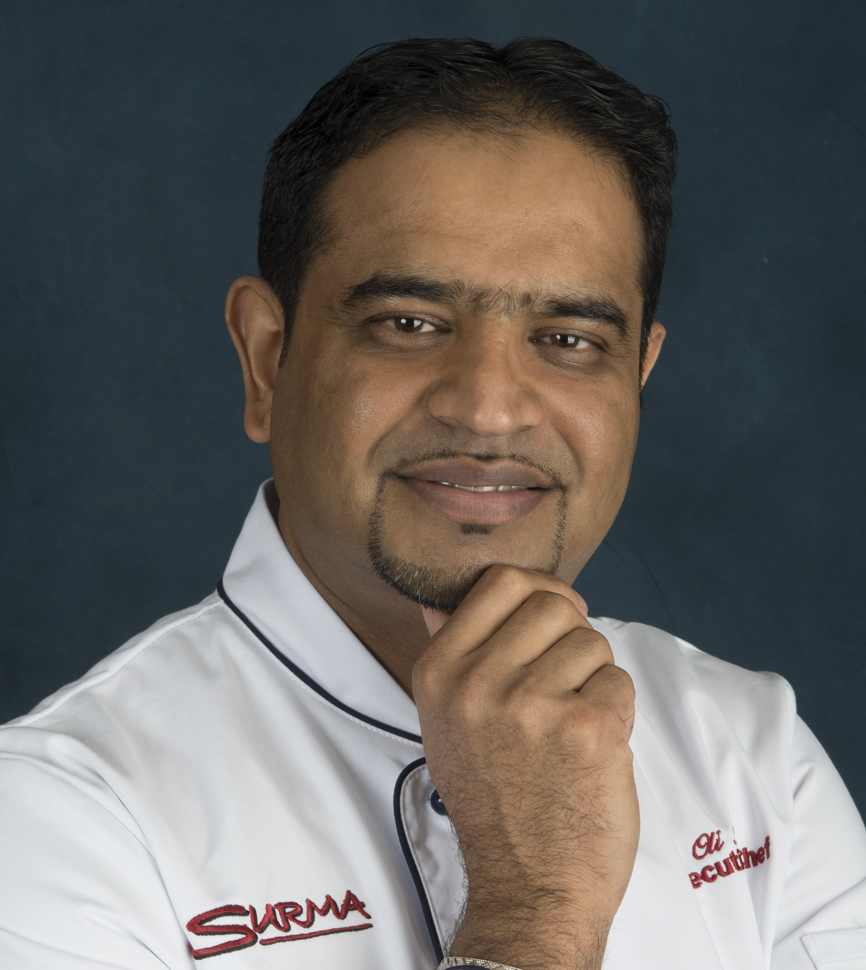
By Laura Evans
Oli Khan is a lot of things to a multitude of people: devoted husband, father to a young son, acclaimed restaurateur, chef, philanthropist, property portfolio holder and teacher name just a handful. But they barely scratch the surface of what this businessman has achieved. From an award winning chef to successful entrepreneur and his passion driving to do more.
This successful multi-tasking entrepreneur said about his core philosophy to succeed in life is that: “always keep your passion at the forefront of your mind with everything that you do. Do not place unnecessary pressure on yourself to accomplish something that isn’t true to your passion.”
Oli Khan is campaigner and keynote speaker at industry events; he also recently held the position of Secretary General of the Bangladesh Caterers Association – UK (BCA). He is now the Senior Vice President of the organisation that was established to provide support to curry houses since 1960. Oli is on a mission – not only to provide for his family and to be a financial success, but also to give back to the wider community.
Rewind to the late 80s and Oli arrived to the UK from Bangladesh. “I came with my mother and siblings,” he says. “My father and uncle already had a chain of restaurants in Kent. I did some courses and then I started working at one of the curry house. A few months later my dad encouraged me to open my own place; he assisted me with funding and I started my own business.” He’s eternally grateful for the support he received.
Oli was just 17 when Tandoori Knight began welcoming customers. “My inspiration comes from my family,” he says. “My mum was a great cook; I used to love watching her. And since I’ve been married, my wife has been very helpful and supportive.”
Over the years Oli has noted with a keen eye the difference between home and commercial cooking – he tries to incorporate the former into the menus of his three eateries, alongside an inventive, fusion style. “I can twist any kind of food to have an fusion style, aromatic flavour,” he says.
Since opening his first establishment Oli’s had restaurant other parts of the UK, and has also dabbled in other fields. “I’ve got a diploma in IT, and advanced level hospitality related courses,” he says.
He used that valuable experience at his own sites, and in 2007 Surma in Luton achieved the coveted five stars from the revered Food Standards Agency. “It was the first takeaway in the UK to be awarded,” he says.
The following year, Surma in Stevenage mimicked that accomplishment, a rating it still holds to date.
Alongside those triumphs, Oli takes his role at the BCA very seriously, as well as the numerous other posts he holds. “I sit on policy-making meetings with the high influential government level peoples and also with the Federation of Small Businesses regularly,” he says.
And Oli works with Curry Life too. “They are part of my success,” he says. “They praise and promote a lot of chefs – that really boosts their profile and encourages them to stay in the arena and grow.
“With Curry Life’s British curry promotion, I have travelled to many part of the world and it did helped me enhanced my profile as a chef.”
But the current conditions have Oli concerned. “At the moment, it’s one of the worst times for the curry industry,” he says. “I’ve been in the UK for more than 30 years and I’ve never seen a crisis like this. I’ve witnessed three recessions, but this is one of the most severe. There are so many issues, ranging from staff shortages, to the pound devaluing, the price of goods going up, and profit margins falling.”
Despite the bleak situation, Oli remains charitable, and is keen to share his experiences. “I love my restaurants, but I’d like to do more teaching,” he says. “I go to a lot of colleges and instruct students, and I’ve held classes for five to nine-year olds in a school, where I showed them how to make some very lightly spiced curry dishes. They really enjoyed it, and wanted to take some home for their parents.” Building on that is a goal for the future.
This strong desire to impart his knowledge extends to the community as a whole. “I work with a lot of organisations, giving them advice, and explaining things in Bengali,” says Oli. “I want to give back – not just to Bangladeshi’s, but to the wider public.”
With what seems to be never-ending array of skills, Oli’s extend to catering skills as well. “The last job I did was for a scientist,” he says. And he tackles veganism head on too. “That’s not a problem,”
Given his wealth of expertise, what are Oli’s top tips as a chef? “I pick the best spices, otherwise you don’t get the right result,” he says. “I roast them and then I grind them. That’s the way I cook and why it’s different from others. I also use shatkora, which is from the lemon family. Just a touch gives a lot of flavour – it’s so aromatic and tasty.”
And what’s next for the esteemed man? He have been featured in over 10 documentaries, and have another one coming out in 2020 by the BBC,” says Oli Khan.
But ultimately, it’s all about guiding and assisting others. “When I learn something, I want to pass on my knowledge and share with others. That’s what I like most – helping others.” With his passion as a foodie, chef, entrepreneur and community activist he has shown the world what a masterful juggler he is, keeping the work-life balance and still leading the way for Curry Industry.
Read more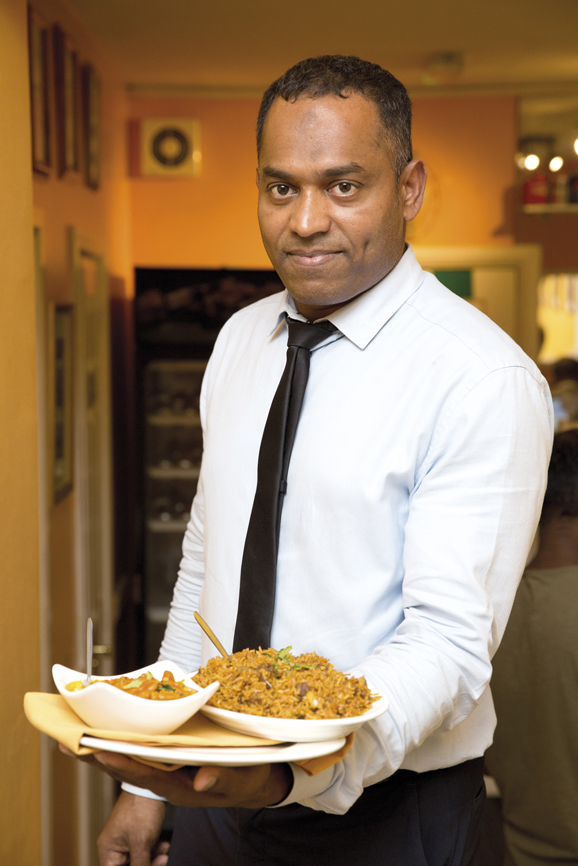
Taste of Nawab definitely worth a visit
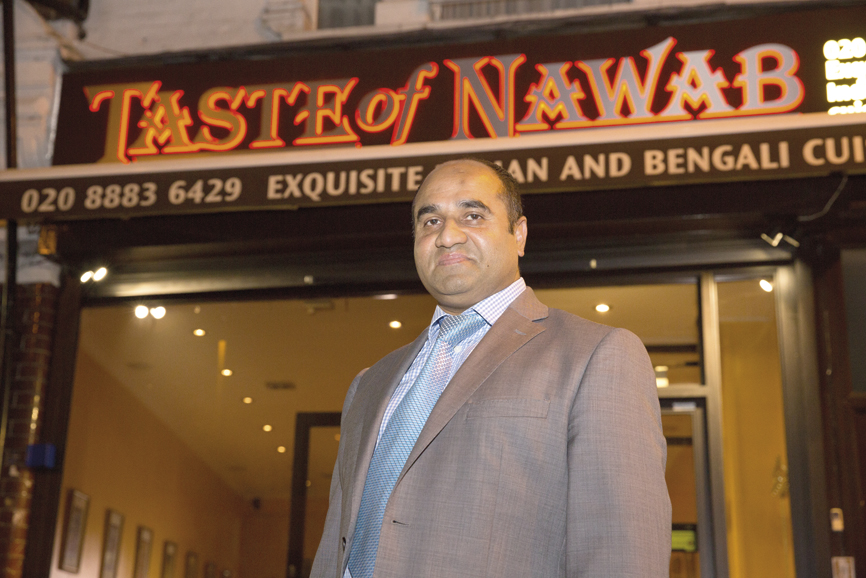
It goes without saying that there are a lot of factors that go into making a successful restaurant. A great chef, a diverse menu, good service and savvy marketing. But when someone tastes your food and finds themselves filling up not only with an amazing meal but with an inexplicable sense of happiness – that’s when you know you’ve really succeeded.
A quick internet search of North-London based restaurant, Taste of Nawab, tells you that it markets itself as an Indian-Bengali restaurant that serves authentic, exquisite cuisine fit for royalty. But there’s something about the relatively small business nestled between rows of shops on Colney Hatch Lane, in Muswell Hill, that makes it special.
There is a sense of warmth, a cloud of familiarity ,that greets anyone who walks through the doors of the restaurant managed by Abdul Rahman (Mujib). He waits at the door and greets me as I approach him- and he does this with every single person who follows me- and that’s the first indication that the restaurant is so much more than just a business to Abdul.
Mild-mannered, engaging and the slightest bit silly, the 46-year-old manager has been in the business for as long as I have been alive- and his journey to where he now stands at Taste of Nawab is as inspiring as any tales of a Prince and his brave conquering.
He starts with a story from his childhood, as he recalls his first job doing paper rounds as a young boy in Islington, Angel. From that 11-year-old paper boy, he went on to work various jobs – at a sweet shop, a mini-market and even a McDonalds – from where he picked up different sets of skills, he finally found his calling. He says, “ After working for six months at Mcdonalds, I moved to a three-star hotel for another six months. Then I moved into an Indian restaurant called Wimbledon Tandoori, in Wimbledon Village where I worked for six years from 1990 to 1996 – and that’s where I learned my trade.”
Endlessly professional– as he shortly excuses himself later in the evening to check in with every single customer – Abdul explains that he has always been clear about what he wanted from his life and that he has been fortunate enough to surround himself with the right people who saw the spark in him.
Abdul strongly believes what you give to someone is what you’ll get back, and this aspect of his work ethic explains why he was promoted to manager within his first month of working at Wimbledon Tandoori. Treating the restaurant like his own, he mentions that customers often enquired if it was his own endeavour, encouraging him to take a step into the restaurant world himself.
So after six years in Wimbledon, receiving praise from everyone who witnessed his impeccable quality of service and his respectful interaction with customers, he moved on to the next chapter of his life – a business to call his own. Explaining how it all began, he says, “ I came to Muswell Hill on September 5th, 1996 and I instantly knew it was for me, but I knew it wouldn’t be easy.”
And easy – it was not. Having to start from scratch, taking over as manager of a restaurant struggling to keep afloat, Abdul had his work cut out for him. He explains,” Before I took over, they wouldn’t get a single customer all night and business was quite bad. When I came in people were sceptical- that I was just one of the people passing through as another manager- but I told people that I could make things better for them with their own support – I wanted feedback from customers on what they wanted from me and where I could improve.”
Soon enough business began picking up, and Abdul credits this to his own skills, to the God looking over him and to the customers themselves. He repeats over and over, throughout our nearly 2-hour conversation, that his customers, and their comfort is his – and his team’s – priority. Gushing about his customers, he says, “In restaurants usually people are trying to rush customers or oversell their products, but what we want is for them to feel comfortable and relaxed. We want the atmosphere to be like their own home, because we look after them like they are our own family.”
As humble as he is and as much as he makes it a point to credit his incredible team at the restaurant, Abdul also knows that he worked hard to get where he is, and he is proud of it. Delving into the canvasing he did to increase the popularity of the restaurant in the early days, he says, “ I did a lot of my charity work to get the local community involved. The first fundraiser was a full house.
“Soon enough I began taking my community work to schools, shops, pubs – where I’d give out leaflets and samples of onion baji, mint sauce and our restaurant’s speciality Nawab sauce. To everyone who loved the food, I’d hand out a takeout menu and ask them to drop in. By the year 2000, people from all over were visiting! ”
With the popularity of the restaurant in mind and the topic of sauces and samples on the table , we talk about the dishes on offer at the restaurant. Abdul explains that while the menu – creative yet clear, simple yet classy- doesn’t offer many dishes there is a range of choices available – whether vegan, vegetarian or non-veg.
Marked clearly with allergen information, the typography on the menu is more than enough to get any food lover salivating. He mentions that while most dishes sell well, karahi was the most popular dish – so the opportunity to order it couldn’t be missed.
As we explore the plethora options, Abdul deftly picks and recommends what he thinks he is best suited to my meat-loving tastes, while also catering to my mum’s vegetarian restrictions. And as the dishes comes out one after another – quick, hot and flavourful – it’s instantly clear that none of Abdul’s claims were overselling the brilliant decadence of the food on offer.
First comes a crispy entree of fried prawns and a cluster of tangy king prawns laid on a sizzling batura. Dancing across your taste buds, the food is filling yet light. And the biryani, naan, chicken karahi, lamb aubergine and chickpea curries that follow, tease you with tinges of spice and sourness, while never overpowering your senses.
Portions large yet manageable, and the food as fresh as they could – it’s the kind of food I left behind when I moved from India three years ago – and the kind of food anyone who loves authentic Indian cooking would love. The biryani and the chickpea curry were definitely highlights amalgamating everything I miss about my hometown with powerful flavours I never knew existed.
Tasting the previously mentioned Nawab sauce was also an unforgettable experience as the unique recipe balances spots of sweetness with tangy touches and spicy flares in perfect harmony – making it the perfect accompaniment to every dish that would need an accompaniment, but admittedly licking it up by the handful is just as satisfying.
Speaking of satisfaction, we discuss what made Abdul choose this career as his path to contentment. He reveals that instead of an efficient restaurant manager he could have ended up a postman- he didn’t pass the exam by just one point – or even a hairdresser. Throwing out another unexpected fact about being a semi-professional barber, he says “ When I was in school in Year 3 or 4 I was asked what I wanted to be when I grew up – I said a waiter, a manager and then have my own business. But while I was in Wimbledon there was a time when I wanted to be a hairdresser and I went into a salon to ask if they had an unpaid vacancy so that I learn but they told me people wouldn’t like me at all because of my skin colour- and that’s when I decided I would be successful in my own right.”
He says, “ I worked hard to get to a point where no one can criticise me, or act like they are above me. But I’m not a magician, it’s the team who support me and the customers who have made us everything we are.”
Incredibly loved and respected by those around him, Abdul who recognises every customer by their face and name has become synonymous with the Taste of Nawab- a fact made clear by the sweet story he proceeds to narrate. He says, “ When I used to go to schools, I would do fundraising for them, donating part of my profits to them. And it was the children who used to say to their parents ‘we want to go to Abdul’s restaurant.’
“Yesterday there was a young girl who’s only nine years old and when her parents asked where she’d like to celebrate her birthday she said there’s only one place – Abdul’s restaurant. It’s these kinds of things that make the whole journey memorable.”
Abdul doesn’t want much more – he is content. But he does hope to expand his restaurant, and explains, “ I want to expand but only here not anywhere else. I’ve seen it many times before, people open three or four restaurants and then one of them collapses. Why? Because one person cannot run four shows.”
He is humble – hoping to run what he already has to the best of his abilities, to learn and grow just as he has been for the past 23 years, and more than anything else to leave behind a legacy that remembers him as someone who did his job well.
Open seven days a week, with a seating capacity of 34, and a BYO alcohol policy, Taste of Nawab is definitely worth a visit if you want great food – but it’s a must-visit landmark in London if you’re looking a second home, where the familiar face and warm handshake of Abdul will greet you– treating you like the special person that you are- every single time you walk through the doors of the royal utopia in Muswell Hill.
Taste of Nawab
97 Colney Hatch Lane, London N10 1LR
Telephone: 020 8883 6429
www.tasteofnawab.com
By Malvika Padin
Read more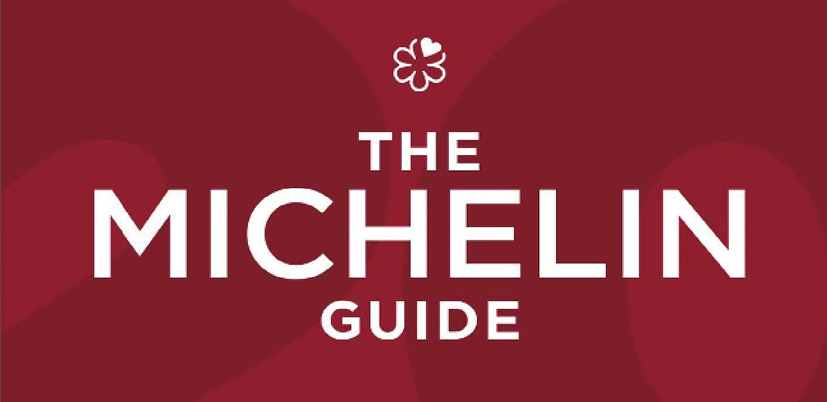
MICHELIN STARS FOR 2020 UNVEILED
After weeks of tension, chefs across the country can finally breathe a sigh of relief – or disappointment. The Michelin guide for 2020 has been announced, and 29 restaurants across Great Britain and Ireland have been awarded shiny new stars. One hundred and eighty-seven Michelin-Starred Restaurants are featured for 2020, including one new Three Star, four new Two Stars and 23 new One Stars.
Three restaurants have been promoted from One to Two Stars: La Dame de Pic in the City of London (Anne-Sophie Pic); The Dining Room at Whatley Manor in Malmesbury (Niall Keating); and The Greenhouse in Dublin (Mikael Viljanen).
Meanwhile, Aimsir in Celbridge – where Jordan Bailey focuses on foraged and preserved produce – enters the guide for the first time with Two Michelin Stars.
The Lake District is a big winner, with three restaurants gaining One Star: the sweet, intimate Old Stamp House at Ambleside; Allium at Askham Hall in Askham, which makes great use of produce from its gardens and estate; and hidden gem The Cottage in the Wood in Braithwaite.
One Star is awarded to Interlude in the Leonardslee Gardens in Lower Beeding and to Pensons in Tenbury Wells, which both focus on local and garden produce; meanwhile, Nottingham’s new One Michelin Star alchemilla really brings plant-based ingredients to the fore.
London has a good geographical spread of new One Stars, with intimate Mãos in Shoreditch; Da Terra in the restored Town Hall Hotel in Bethnal Green; Dysart Petersham, set in a charming early1900s house in Richmond; and Japanese Endo at The Rotunda in the old BBC Building in Shepherd’s Bush.
Other city establishments include sophisticated Indian restaurant Opheem in Birmingham and stylish Mana in Manchester, which receives the city’s first Michelin Star in over 40 years.
The Republic of Ireland also has much to celebrate, with intimate wine-bar-cum-bistro Bastion in Kinsale being promoted from a Bib Gourmand, and funky modern Variety Jones in Dublin and grand hotel dining room The Oak Room in Adare both receiving One Michelin Star.
“This is an amazing year for the Republic of Ireland, with five new Michelin Stars being awarded – two of them at Two Star level. This brings the total number of Starred restaurants in Ireland up to 18 and is just reward for the determination of young chefs who are keen to make their mark on the Irish dining scene,” says Rebecca Burr, Director of the Michelin Guide Great Britain & Ireland.
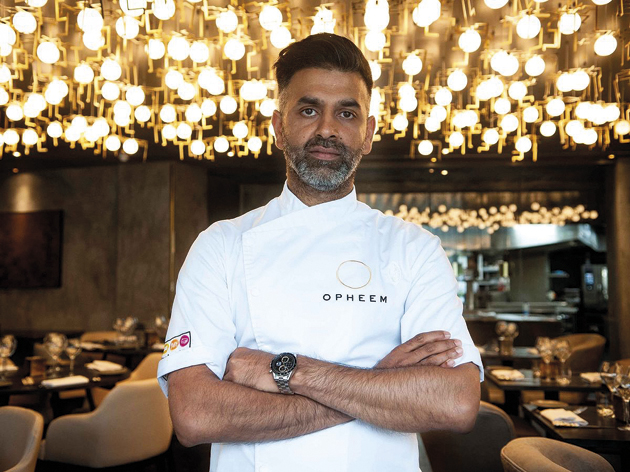
Remarkable Achievement of Aktar Islam
Aston-born chef-owner Aktar Islam is probably the first British Bangladeshi Chef in the UK to be awarded a Michelin Star.
Birmingham based chef Aktar Islam won Gordon Ramsay’s F-Word back in 2009. Akhtar Islam now won first Michelin star for his Birmingham’s Summer Row restaurant Opheem, which was announced early October 2019.
In a heartfelt message on Facebook, Aktar wrote: “Gordon Ramsay, ten years ago you gave me my big break and yesterday Opheem was awarded its first Michelin star.
“Thank you, chef, for setting me up for this incredible journey.”
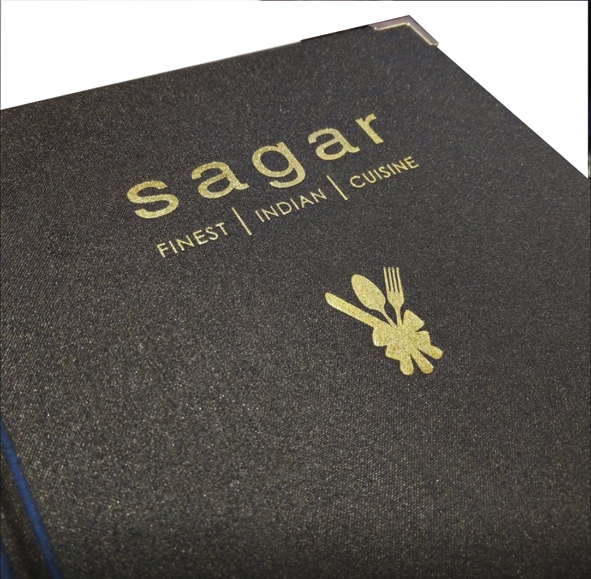
Restaurant fined after avoiding safety warnings from council
The Sagar Indian restaurant in Seaham, County Durham, has been fined almost £7,000 after Durham County Council food safety officers carried out tests and confirmed that the curry was misleading and sold as nut-free to one of the officers, who clarified specifically that she had a peanut allergy in November 2018, and requested a curry to be made without any peanuts.
The Newton Aycliffe Magistrates Court heard that, despite the reassuring from the staff that the curry provided would be nut-free, it was confirmed after analytic tests that small amounts of peanut protein was still present in the curry, which made it dangerous enough to induce an allergic reaction also known as an anaphylactic shock.
The food safety officers returned to the premises in January 2019, to do a safety check and where the issue of cross-contamination had been discovered. This was from the result of uncovered nut powder that was stored next to other spices and very close to the stove where the cooking takes place.
This wasn’t the first time the restaurant had been under investigation, back in 2015, The Sagar, had already received a warning from the council, which again confirmed through a test, that traces of peanuts were still visible in a confirmed nut-free dish. Upon confirming this news previously, the restaurant was invited to attend free training and support on the topic of food safety and allergens, but this was ignored and nobody decided to take the issue seriously.
Joanne Waller, The head of community protection, said: “Recent high-profile deaths resulting from allergic reaction to food illustrate the importance of this case. The risk to members of the public who may be exposed to allergens either due to poor practices during food preparation or through undeclared ingredients can be severe.
“Customers who suffer from allergies expect food businesses to take their needs seriously. We hope the sentence imposed by the magistrates serves as a warning to food businesses that fail to control the risks posed by allergens.”
None of the staff or representatives from the restaurant attended any of the court hearings, which resulted in the company being fined £5,500, costs of £1,293.95 and victim surcharges of £170.
As a result, the company’s solicitor stated that the restaurant has now made attempts to implement some major changes, including a strict staff -training scheme, which educates on allergies, however still, the restaurant still is unable to guarantee an allergen-free meal.
High Profile allergy related death cases are becoming a huge safety issue within the food industry and this leads us onto some of the serious issues that need to be addressed from this story being the storage of ingredients, how to handle a customer who has a reaction on the premises and how to implement good risk control measures.
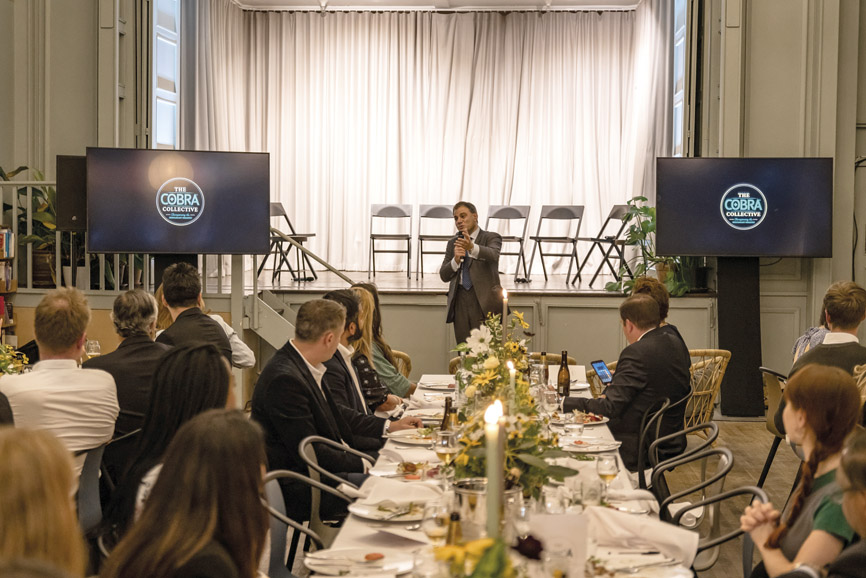
Cobra Collective initiative launched in London
Cobra Beer, founded by British Indian entrepreneur Lord Karan Bilimoria, has launched an initiative designed to support the UK restaurant industry in early September, The evening brought together a panel of highly successful chefs, restaurateurs and restaurant industry entrepreneurs to form the collective circle and presented a number of issues facing the Hospitality sector and every member’s personal journey of getting into the sector over a wonderful three-course meal and a taster session of the latest version of The Famous Gluten- Free Cobra beer. The Collective group intends to roll out a programme of inspiring business master-classes, interactive workshops and ‘how to’ videos, developed to support start-up hospitality entrepreneurs and existing restaurant owners at what is a turbulent time for the hospitality sector.
The Panel members consisted of chef, entrepreneur and Master-Chef host Monica Galetti, Michelin-starred chef Andrew Wong, restaurateur Nisha Katona MBE, Podcast presenter and content creator Alexandra Dudley, Beer Sommelier Ed Hughes alongside Cobra Beer founder and CEO Lord Karan Bilimoria. Each member of The Cobra Collective will work with the Cobra brand to develop a range of exclusive and informative content and events based on their individual areas of expertise within the restaurant sector.
The agenda for the Autumn will cover interesting topics on; How to Create Cultural Harmony in the Workplace, The Highs and Lows of Business Podcast, How to Create and Grow a Brand within Hospitality Q&A, Brewed Smooth for all Food; Beer & Food Pairing Masterclass in an Increasingly Digital Landscape, How to Leverage Social Media in the Culinary World, Getting Ahead as a Female in the Hospitality Industry
Lord Karan Bilimoria comments, “Current economic forces and shifting consumer trends mean that running a restaurant business has never been harder, or more beset by external challenges. As a brand largely stocked and consumed in pan Asian and ethnic restaurants across the UK, Cobra wants to bring a set of inspirational hospitality leaders together to support this hugely important sector of the restaurant industry. We are committed as a business to support entrepreneurs and independent restaurateurs and see the Cobra Collective as an ongoing and growing initiative; we’re delighted to announce our key members at this time and look forward to working with them over the coming months.”
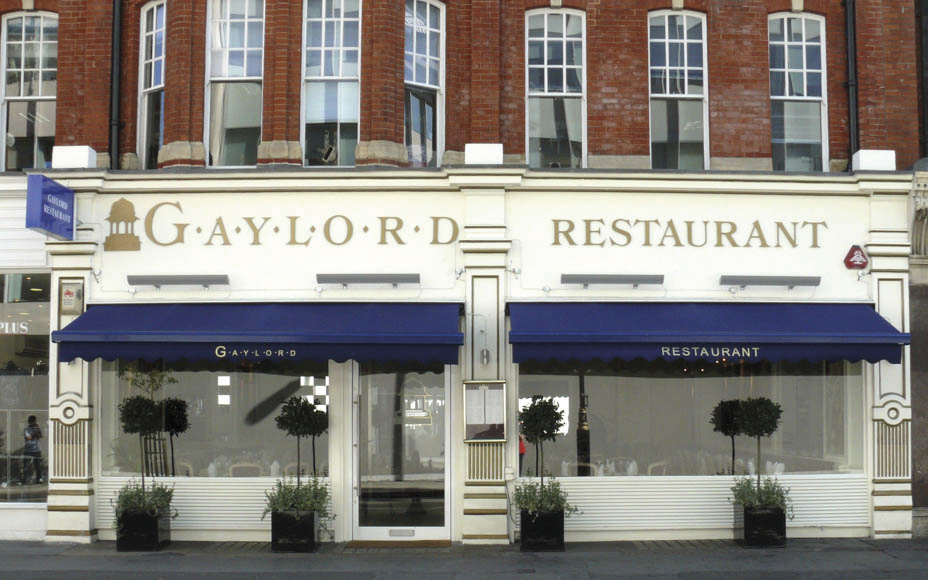
A sad goodbye to the legendary Gaylord Restaurant
The exquisite Indian restaurant the Gaylord based in Central London’s Fitzrovia has closed down after 53 years in the capital. It is no longer listed in book a table or open table.
Gaylord will make way for Banjarah, the London debut for New Delhi’s Azure Hospitality. The Azure Hospitality, which is based in Delhi, runs several successful restaurants across India.
According to planning documents, the new restaurant Banjarah will occupy the basement and ground floors of 79-81 Mortimer Street and details to be worked out.
The Gaylord first opened its doors in 1966 and was famous for Indian Mughlai Cuisine.
Despite its popularity, in 2017 the Gaylord got into trouble because of serious breach of food hygiene standards. The Westminster City Council served the Emergency Hygiene Prohibition Notice and it was forced to close to make necessary improvement was carried out.
After reopen, it never really recovered to gain its reputation back and had continuous bad reviews.
Anyway, finally the site has been taken over by Azure Hospitality from India.
Read more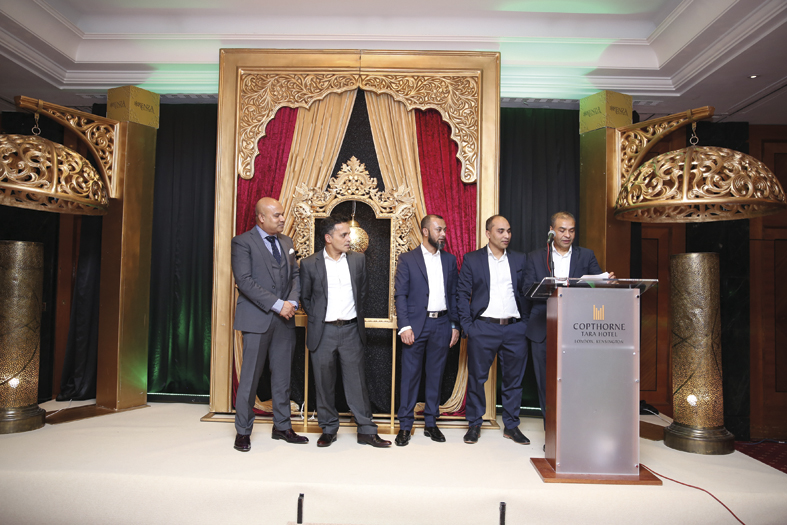
Chef Salim Javed of Mint Caterers
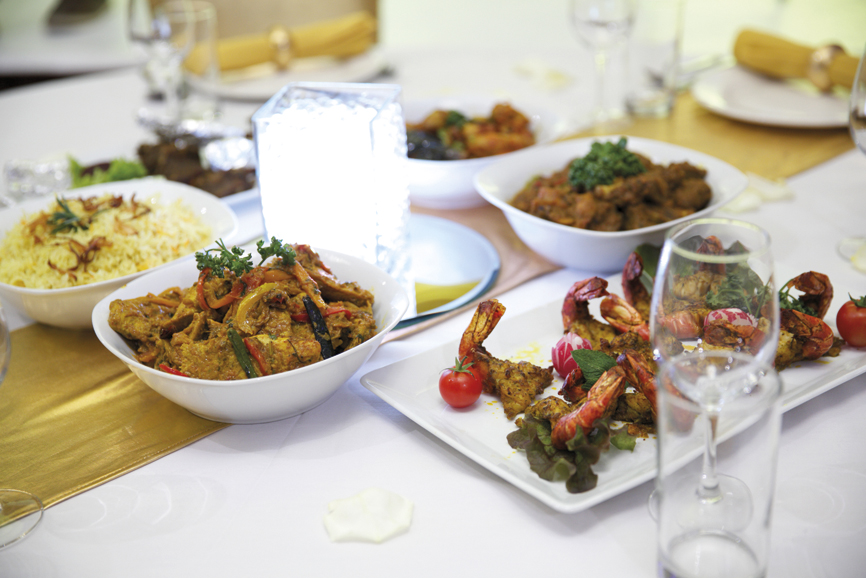
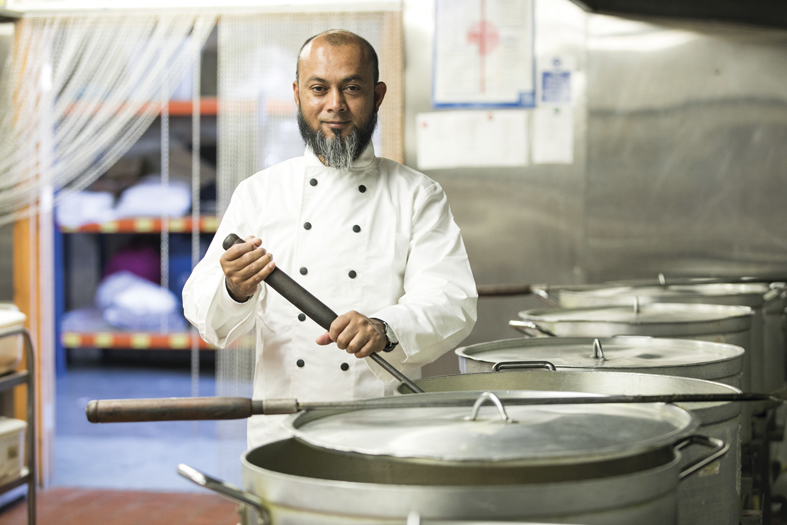
Interview by Tahira Khan
I had the wonderful opportunity to speak to The Founder and Creator of The Mint Catering Group over a coffee and speak to him about his passion for the food industry, how he got there and the highs and lows of his business journey. I also got to find out about how he got married in between all the restaurant ventures, the trips back and forth to Bangladesh and how his foodie time abroad has helped him achieve and master his final vision.
Tell me about your relationship with food as a child?
Well as a child I saw my mum cooking and heard good things about her cooking from back home in Bangladesh and I tried to get involved at home with her cooking, if she was cooking something I was on the side watching her and giving her ideas and then we would end up making something completely different altogether.
Growing up during the college years and my twenties
It started when I was at college studying for Business Studies as everyone did at the time and one of my uncles took me to his restaurants for some part-time work in Crawley (Brighton) in the early nineties when I was just twenty years old. It was the long holiday period when I started there six days a week. There was many other staff there chefs, caterers from the older generation and they pushed me into a higher position, so I started at front of house for a good few months, and then after three months my uncle said he was going to get married and I had to run the restaurant, so I was literally thrown into the deep end. I was put under a lot of pressure but I took charge of the running of the kitchen and front of house but I was enjoying it at the same time. I loved seeing the food come to life and was very involved with food giving different ideas to the chefs, like why don’t you add this or that and I ended up changing the recipe every time (laughs).
So what was your first Business Venture?
I took some time out to work out what I really wanted to do, and all I knew was that I enjoyed working with food but still not sure exactly what. But I needed to do something for myself to stand up on my own feet as my family was suggesting and also putting on the pressure to get married. But I went in a complete different direction from the catering sector and at the time in the mid 90’s there was a growing popularity in becoming a driving instructor and owning a driving school you know like BSM, I had to get serious about things now. So my first venture was completely off track, I managed to get a few friends and business partners together and invested in the business of owning a driving school, even though I wasn’t a qualified driving instructor. By four months we had about thirty cars, it was doing really well, I felt that the business was well established and on its feet so that’s when I left my partners in charge of the business and travelled to Bangladesh to finally go and find a wife.
Beginning married life
When I was in Bangladesh I stayed there for quite a few months to decide who I wanted to get married to, it was a long process of checking out potential brides and I didn’t like some of the aspects of the traditions. My mother on the other hand was quite good who gave me plenty of time to choose as I wished, and then I knew I had to stay a long time to make a decision and choose the right person but I wasn’t happy with the choices given to me, Then through a friend I met a girl who I eventually liked. My mother got fed up after six months and said “right I think we have had enough time now, have you made a decision otherwise we are heading back to the UK”. It was at that point I said I had someone in mind, from thereon it was a very fast process of checking out the family background, arranging the marriage date through my family, it took about six months altogether.
After my return
When I arrived back to the UK and after seeing a decline in the driving school over a few months, it didn’t work out due to many reasons and I ended up becoming in debt and had to sell all the cars. I tried to save the business but it was better to close it down. I needed to do something and the only thing I knew was catering. But the thing I hated was alcohol and I wanted to avoid that, even though my uncle’s offered me a decent percentage of the profits, but deep down it wasn’t right for me. Then I was offered another restaurant management project after staying there for a week I decided that it needed a complete restructure to get it back upto standard again, that’s what I have been doing for the last 8-9 years. During that period I started going back into the kitchen again and began changing the menu again by chopping and changing things around like I did with my mum just a bit of innocent experimenting here and there. I then discovered that no one in the food industry has traditional home-cooked menus, instead they all had a gravy base. There wasn’t anything like home-cooked fusion dishes. One dish was chicken with tarragon that I created. Then there is a traditional Bengali lemon called the ‘Shatkora’ that originates from Sylhet, I created specialty based curries from that fruit and it had such an amazing response from the customers.
Managing Joint Ventures
A couple of my friends had a restaurant and catering company and I was called in there to help restore the restaurant after the success of the last project.
I looked into that project and the first thing I said was taking out the alcohol bar and shorten the menu with just a few authentic dishes not twenty. We also looked into the wedding sector and introduced the waiter service, crockery and cutlery into the Asian catering industry rather than the plastic disposables used in local community centres at the time and over time we became the local Bengali household name in the community for Asian wedding catering. There was even someone who came from Bristol who wanted to print our name in the invitation in recognition of the reputation and prestige we had. I always wanted to do something big, so during that time
I made a business plan to create a banqueting hall. I took ownership of The Leyton Town Hall, which I planned to call ‘Entourage X’ a multi functional wedding banqueting hall, restaurant and on site catering. It was closed for ten years. It was a great listed building and had lots of potential but in 2011 I lost out big time due to the issues from the conservation officers which were really delaying the opening and it was resulting in huge debts of rents mounting up and I had to sell assets back home to pay everything off. It was the worst time loss for me in many things. It was better to let it go, it was a really tough time, I was lost, but after that I headed to Bangladesh again for a long break and disconnected from everything and everyone.
The Turning Point
By 2009 I had left the partners to leave to go on a long foodie trip to India, North Bangladesh, The Middle East, Goa and Calcutta again. I tried all sorts of food, from street food to fine dining and taster sessions with the best 4-5 Star Chefs. I started getting involved again with the ideas and recipes and still loved it. Then I finally came back with a light bulb moment and `I knew that catering and cooking was my passion every single time.
One of my good acquaintances was trying to track me down with a banqueting hall project in Tunbridge Wells. When they finally got hold of me they asked me to join there venture and I agreed to manage the project for a while to help them out but I knew it was temporary and I was still going to have another sustainable business that’s when I finally started up “Mint Caterers” with my business partners who I want to thank for there help, they are; Safiul Alam, Abu Taher, Shahedur Rahman, and Jahangir Hasan Mintu, who all collaborated the new business concept based upon the aroma and taste of the mint leaf that is used in food and beverages. They have all been amazing and thank God we are doing very well. We have put our business heads together and achieved to gain the credibility of many of the top 5 Star Hotels such as The Hilton, Chigwell Marquees, Radisson Group, Fennes Estate and many more by providing a bespoke catering service for all occasions and all people not just the Asian community and it has worked out really well, thanks to God. My future plan is to keep doing this and expanding within the hotel sector for another few years and then I plan to retire and relax finally inshallah.
Mint Caterers
13 A Rigg Approach, Leyton, London E10 7QN
Phone: 020 3302 7870
www.mintcaterers.co.uk
Read more


